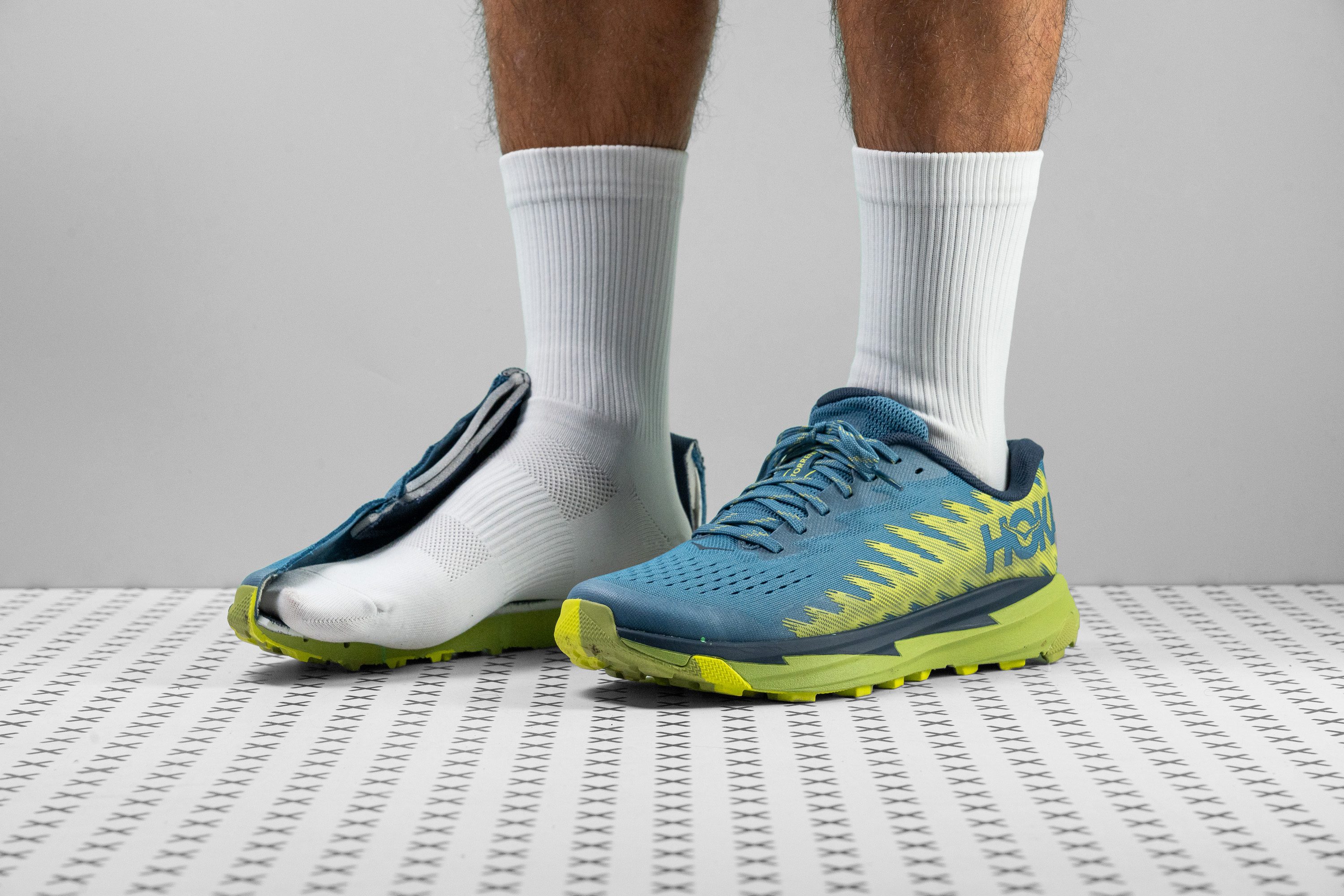Our verdict
Pros
- Exceptionally stable
- Excels on nearly all dry terrains
- Lower stack height offers a more natural ride
- Adaptable across various running paces
- Reasonably priced
- Excellent performance in winter conditions
- Incredibly durable outsole
- Comfortable upper
Cons
- Lacks a rock plate
- Not suitable for ultras
- Too rigid for technical trails
Audience verdict
Comparison
The most similar running shoes compared
+ + Add a shoe | |||||
|---|---|---|---|---|---|
| Audience score | 84 Good! | 83 Good! | 86 Good! | 89 Great! | |
| Price | £130 | £135 | £140 | £130 | |
| Trail terrain | Moderate | Moderate | LightModerate | LightModerate | |
| Shock absorption | - | - | Moderate | Low | |
| Energy return | - | - | Moderate | Moderate | |
| Arch support | Neutral | Neutral | Neutral | Neutral | |
| Weight lab Weight brand | 9.1 oz / 258g 8.7 oz / 247g | 9.6 oz / 271g 9.5 oz / 270g | 10.1 oz / 286g 9.2 oz / 260g | 10.3 oz / 291g 10.3 oz / 291g | |
| Drop lab Drop brand | 7.1 mm 5.0 mm | 8.9 mm 6.0 mm | 7.2 mm 6.0 mm | 8.7 mm 8.3 mm | |
| Strike pattern | Mid/forefoot | HeelMid/forefoot | Mid/forefoot | HeelMid/forefoot | |
| Size | True to size | Half size small | True to size | Slightly small | |
| Midsole softness | Balanced | Soft | Soft | Balanced | |
| Difference in midsole softness in cold | Small | Normal | Big | Small | |
| Toebox durability | Decent | Very bad | Bad | - | |
| Heel padding durability | Decent | Bad | - | - | |
| Outsole durability | Good | Decent | - | - | |
| Breathability | Moderate | Moderate | Moderate | Moderate | |
| Width / fit | Medium | Medium | Narrow | Medium | |
| Toebox width | Medium | Medium | Narrow | Medium | |
| Stiffness | Stiff | Stiff | Moderate | Moderate | |
| Torsional rigidity | Stiff | Stiff | Flexible | Moderate | |
| Heel counter stiffness | Moderate | Stiff | Moderate | Flexible | |
| Lug depth | 3.6 mm | 3.4 mm | 2.8 mm | 3.5 mm | |
| Heel stack lab Heel stack brand | 29.5 mm 23.0 mm | 29.3 mm 34.0 mm | 30.6 mm 32.0 mm | 27.2 mm 29.6 mm | |
| Forefoot lab Forefoot brand | 22.4 mm 18.0 mm | 20.4 mm 28.0 mm | 23.4 mm 26.0 mm | 18.5 mm 21.3 mm | |
| Widths available | Normal | Normal | Normal | Normal | |
| Season | All seasons | All seasons | All seasons | All seasons | |
| Removable insole | ✓ | ✓ | ✗ | ✓ | |
| Orthotic friendly | ✓ | ✓ | ✗ | ✓ | |
| Ranking | #236 Bottom 38% | #271 Bottom 29% | #182 Top 48% | #110 Top 29% | |
| Popularity | #309 Bottom 19% | #204 Bottom 46% | #210 Bottom 45% | #169 Top 45% |
Who should buy
We highly recommend the Torrent 3 for:
- Hoka road running shoe enthusiasts venturing into trail running for the first time.
- Runners seeking a versatile trail shoe that outperforms road-to-trail options.
- Trail runners with mild stability needs in search of a comfortable and long-lasting training partner.
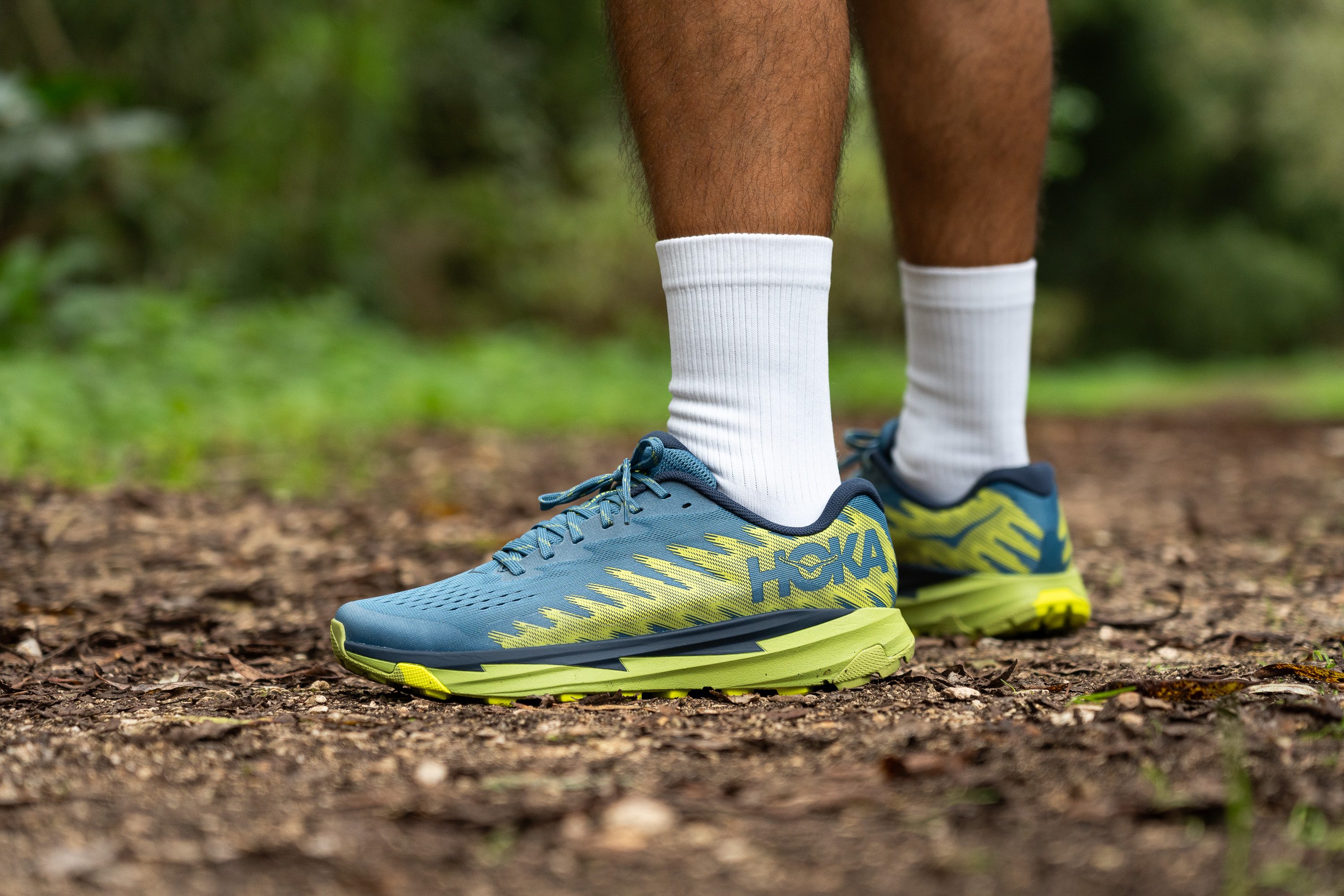
Who should NOT buy
If budget isn't a major concern, we believe there are superior options with additional features such as a Vibram outsole and enhanced cushioning. For example, the Hoka Speedgoat 5 or the Hoka Tecton X 2 are excellent alternatives.
Additionally, the Torrent 3 isn't the ideal choice for ultra distances, whether in racing or training.
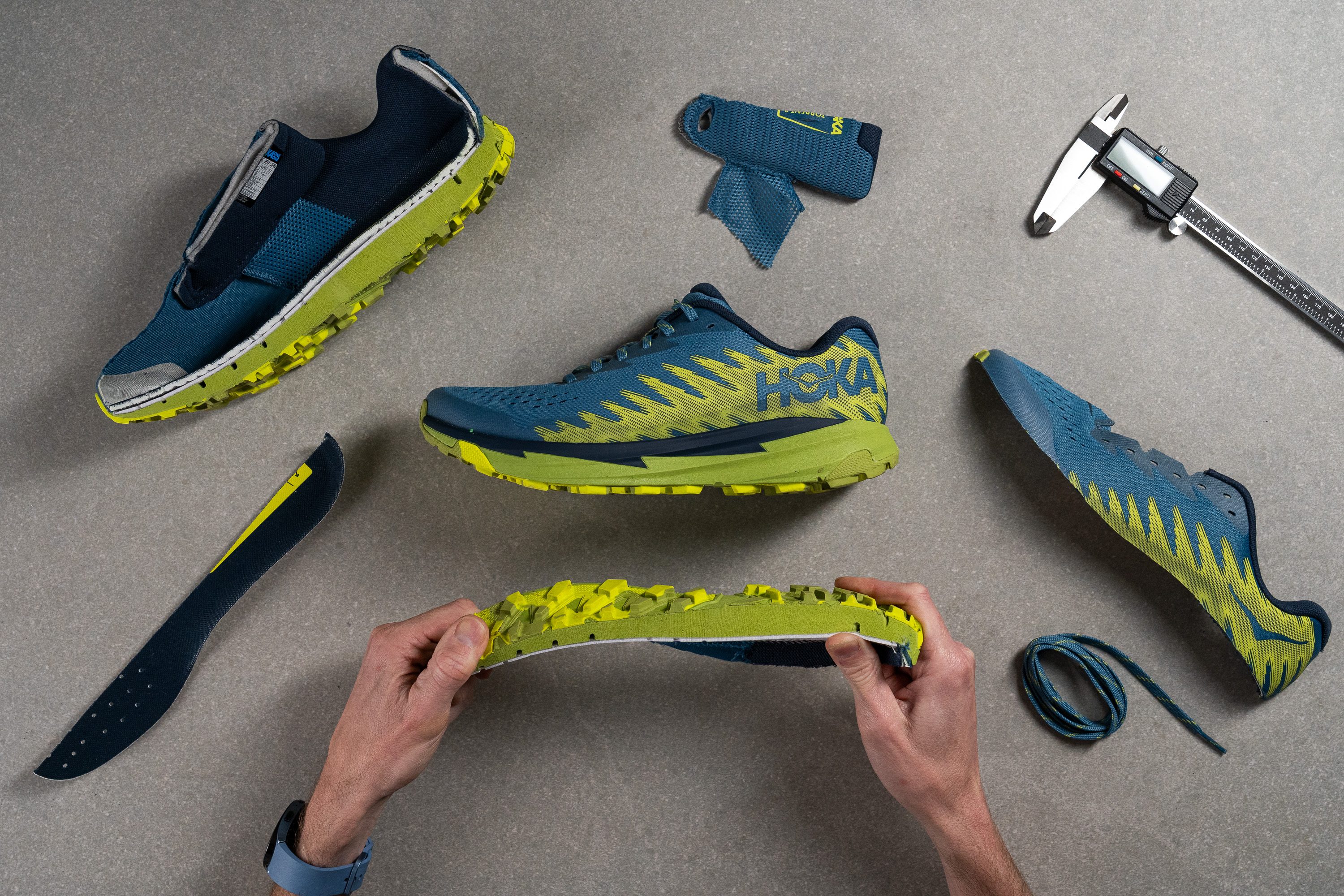
In those scenarios, shoes with more responsive and thicker cushioning are preferable. Models like the Nike Ultrafly or the Saucony Endorphin Edge provide a ride that's both protective and more responsive, thanks to their premium cushioning.
Cushioning
Despite having only 1.8 mm thickness in the outsole (+ lugs), the Torrent 3 might just be one of the most durably crafted shoes out there based on our previous test.
We have zero worries about wearing out the outsole.
Heel stack
We described the cushioning as "decent" just before because, at first glance, it didn't seem like it had an ultra-high stack. But it's important to note that you don't always need that, especially for short to medium-distance runs. Too much foam underfoot can add unnecessary weight.
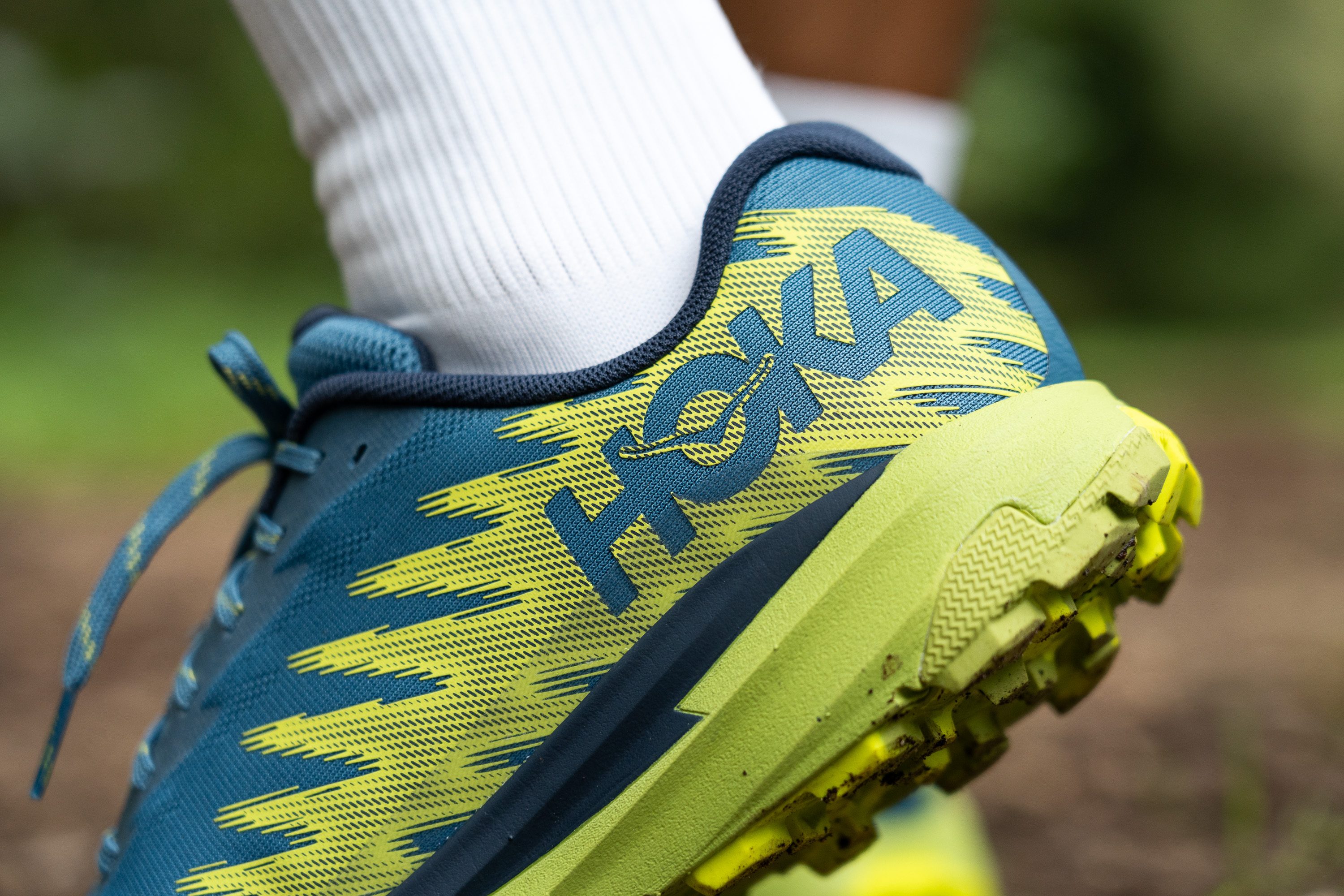
The Torrent 3 is designed for medium distances, probably up to 30K at most. This is our assessment after measuring the heel at 29.5 mm, which falls below the average.
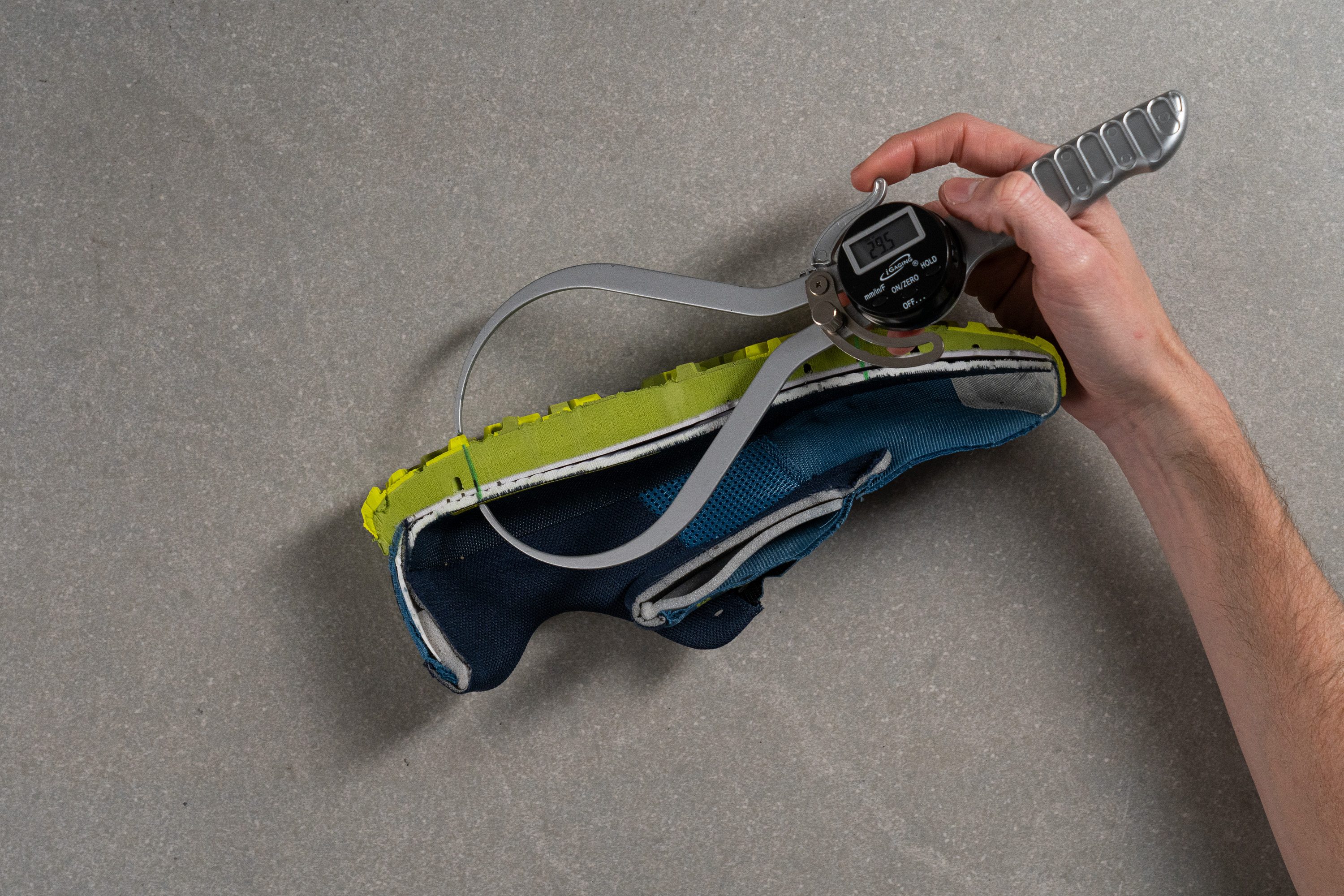
| Hoka Torrent 3 | 29.5 mm |
| Average | 32.6 mm |
Forefoot stack
The forefoot of the shoe follows the same concept, being slightly thinner than what you'd usually find in an average trail running shoe, at 22.4 mm.
This means forefoot strikers looking for a shoe for longer distances might consider something more cushioned, like the Hoka Mafate Speed 4.
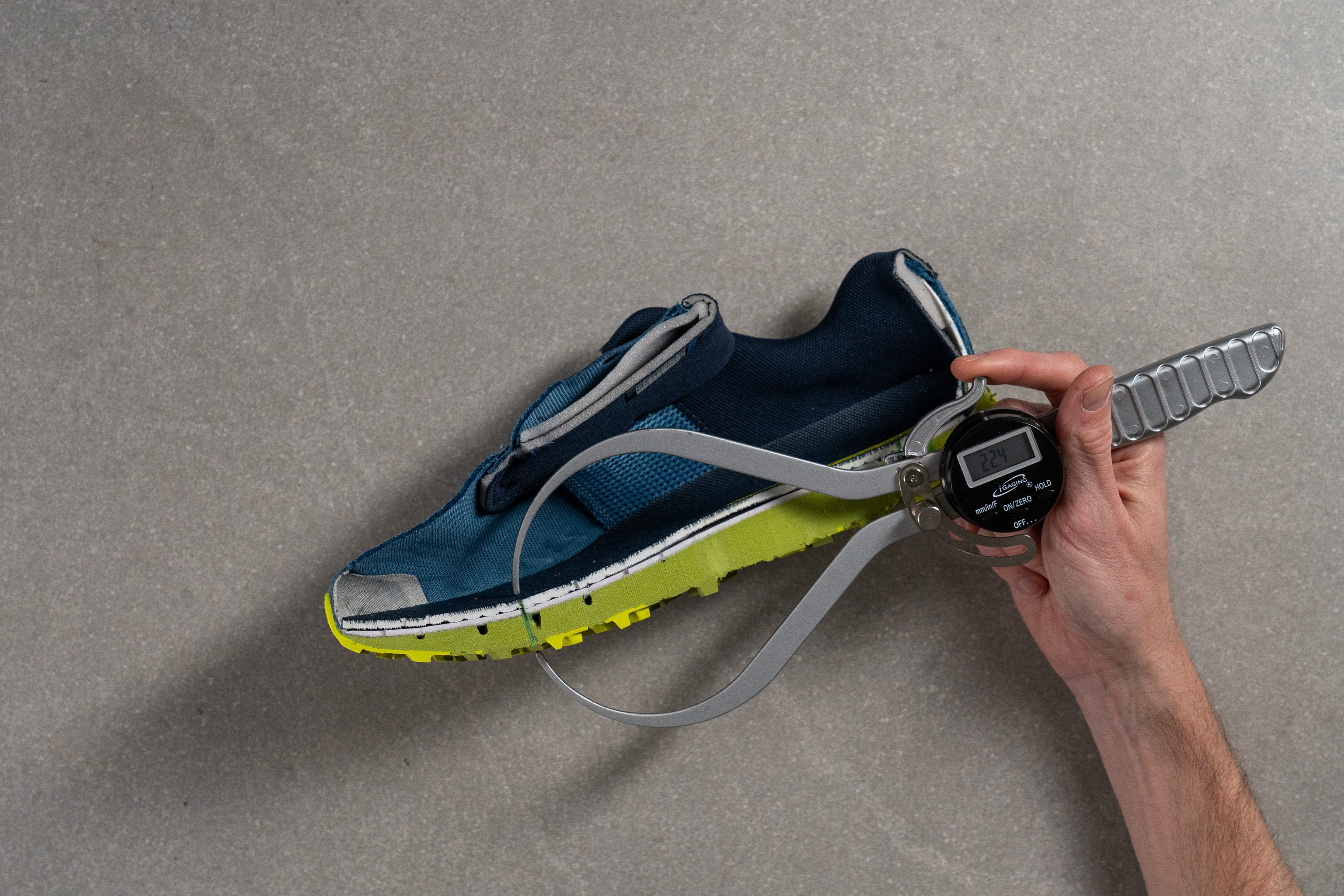
| Hoka Torrent 3 | 22.4 mm |
| Average | 25.1 mm |
Drop
After taking these two measurements, we calculated the difference to find a 7.1-mm heel-to-toe drop.
This drop appeals to a wide range of runners, potentially accommodating everyone.
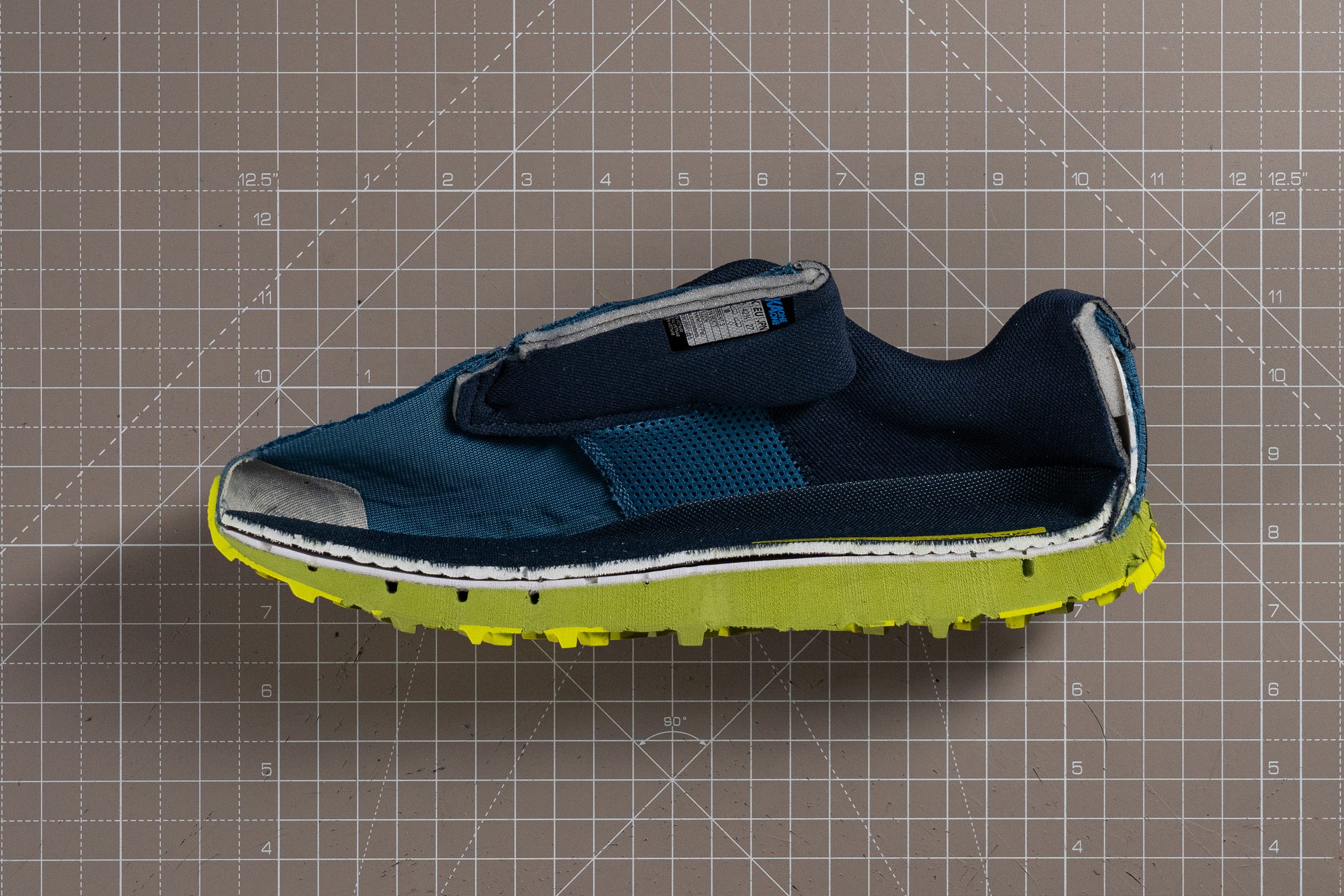
| Hoka Torrent 3 | 7.1 mm |
| Average | 7.6 mm |
Midsole softness
The midsole softness of the ProFly foam came in at 23.9 HA, which is a balanced approach, not aiming at the plush-feel of other Hoka shoes.
This makes the Torrent 3 a shoe catered for individuals who prefer a more traditional, firmer feel underfoot—and also a good choice for faster runs where a denser foam makes the difference.
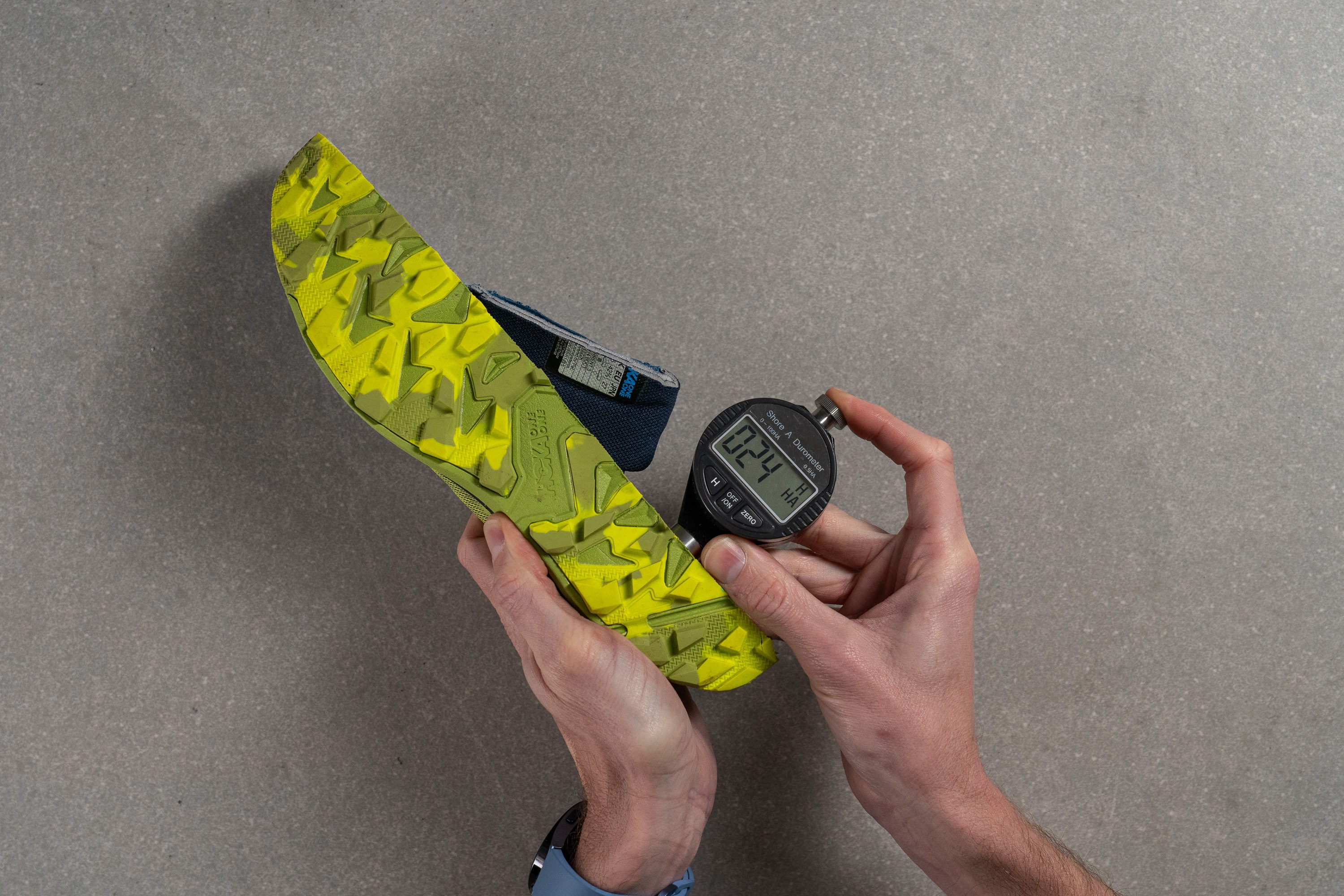
| Hoka Torrent 3 | 23.9 HA |
| Average | 22.0 HA |
Size and fit
Size
Hoka Torrent 3 fits true to size (90 votes).
Internal length
| Hoka Torrent 3 | 271.1 mm |
| Average | 269.0 mm |
Width / Fit
Before measuring, we always test each shoe on our feet, and the Torrent 3 immediately struck us as narrow. However, relying solely on feel doesn’t meet the RunRepeat standard. Instead, we crafted a precise replica of the shoe's interiors using our custom gel formula.
This approach allowed us to quantify our impressions. The measurement came in at 93.6 mm, confirming our initial thoughts: it’s undoubtedly a narrow shoe.
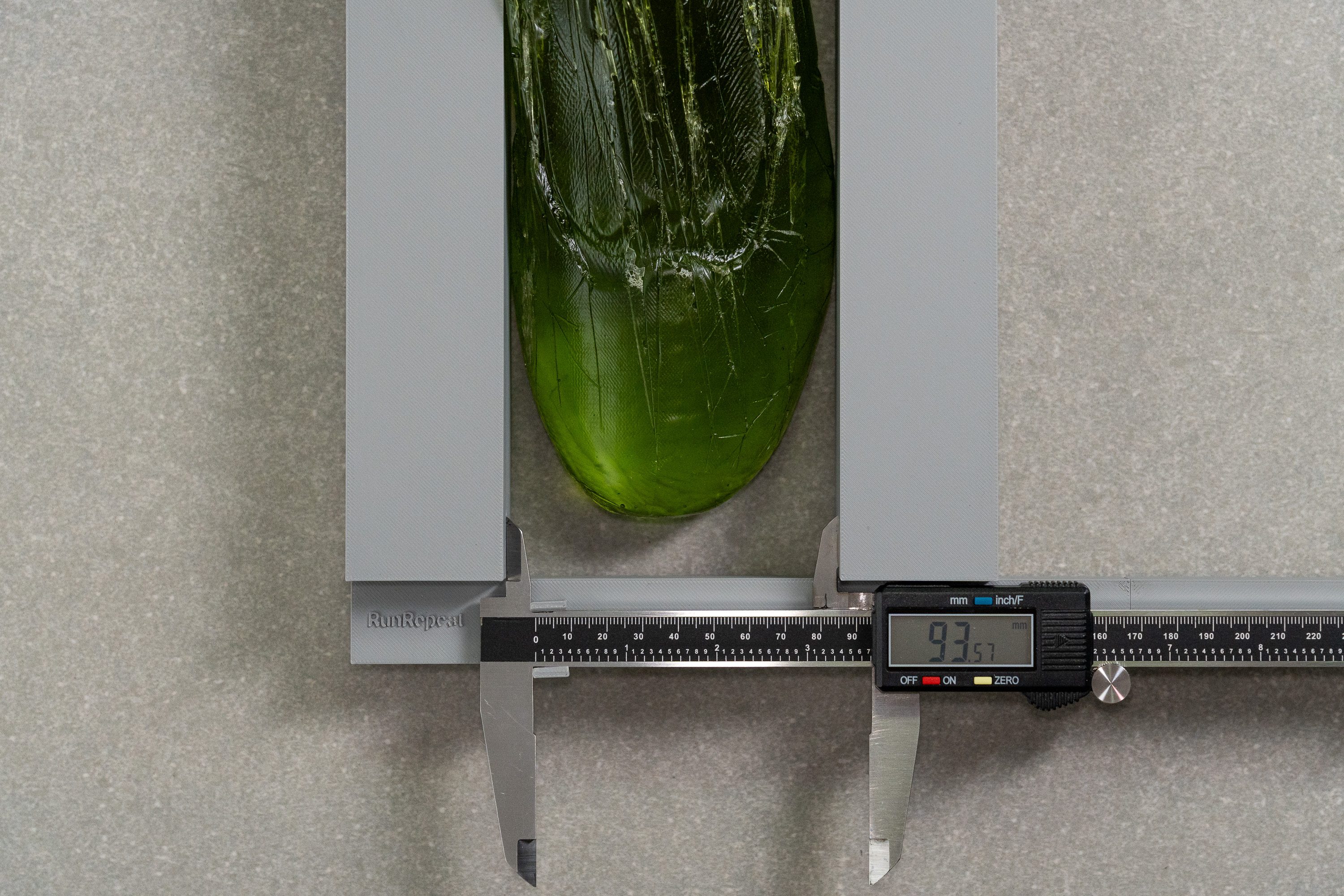
| Hoka Torrent 3 | 93.6 mm |
| Average | 95.6 mm |
Toebox width
The big toe area features a pronounced taper, making it a comfortable choice for those with narrow feet, but less ideal for anyone who dislikes pointy toeboxes. Measuring 71.1 mm, it offers minimal room for toe splay.
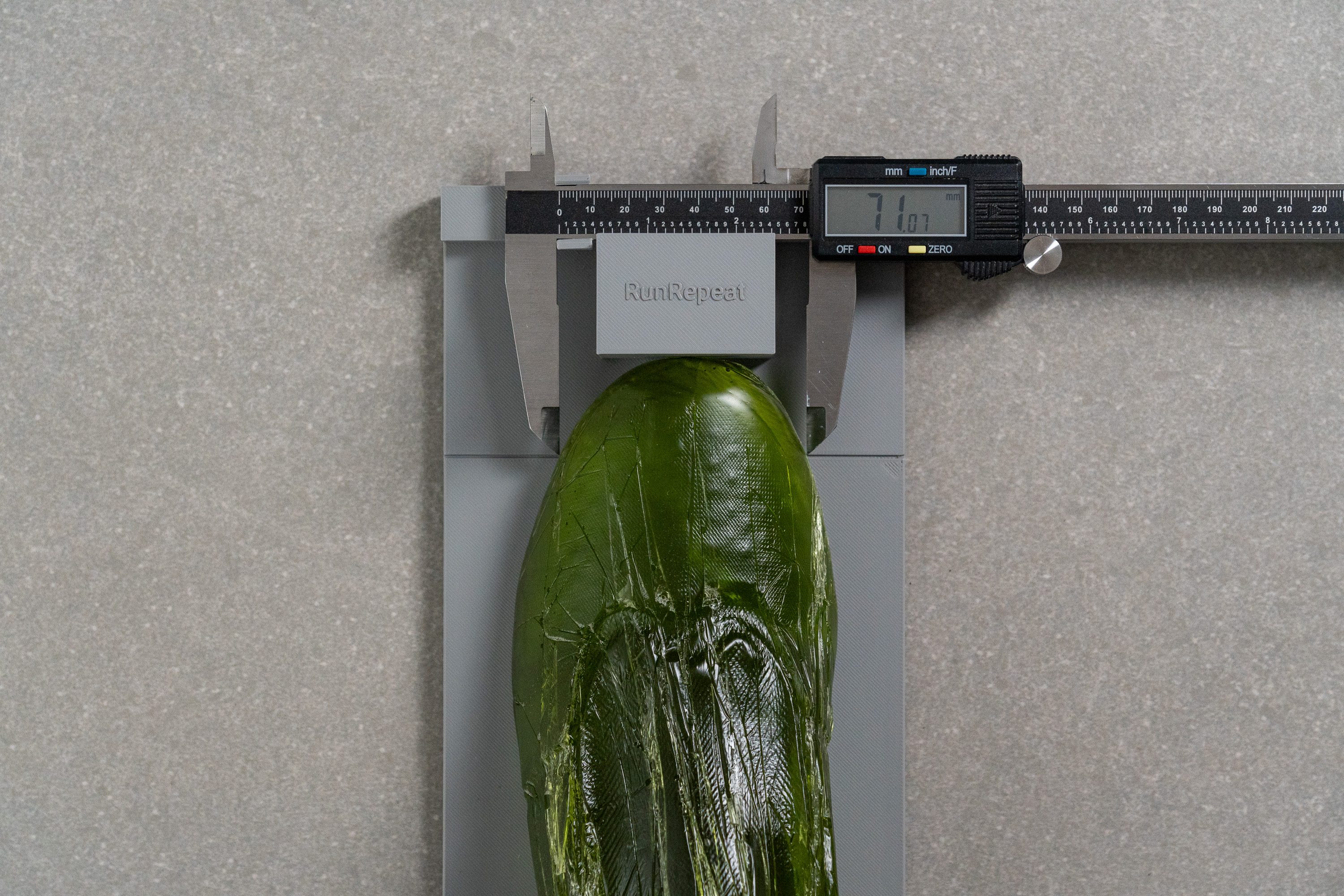
| Hoka Torrent 3 | 71.1 mm |
| Average | 74.6 mm |
Toebox height
On the flip side, Hoka provided some generosity with the toebox height, measuring a substantial 28.6 mm!
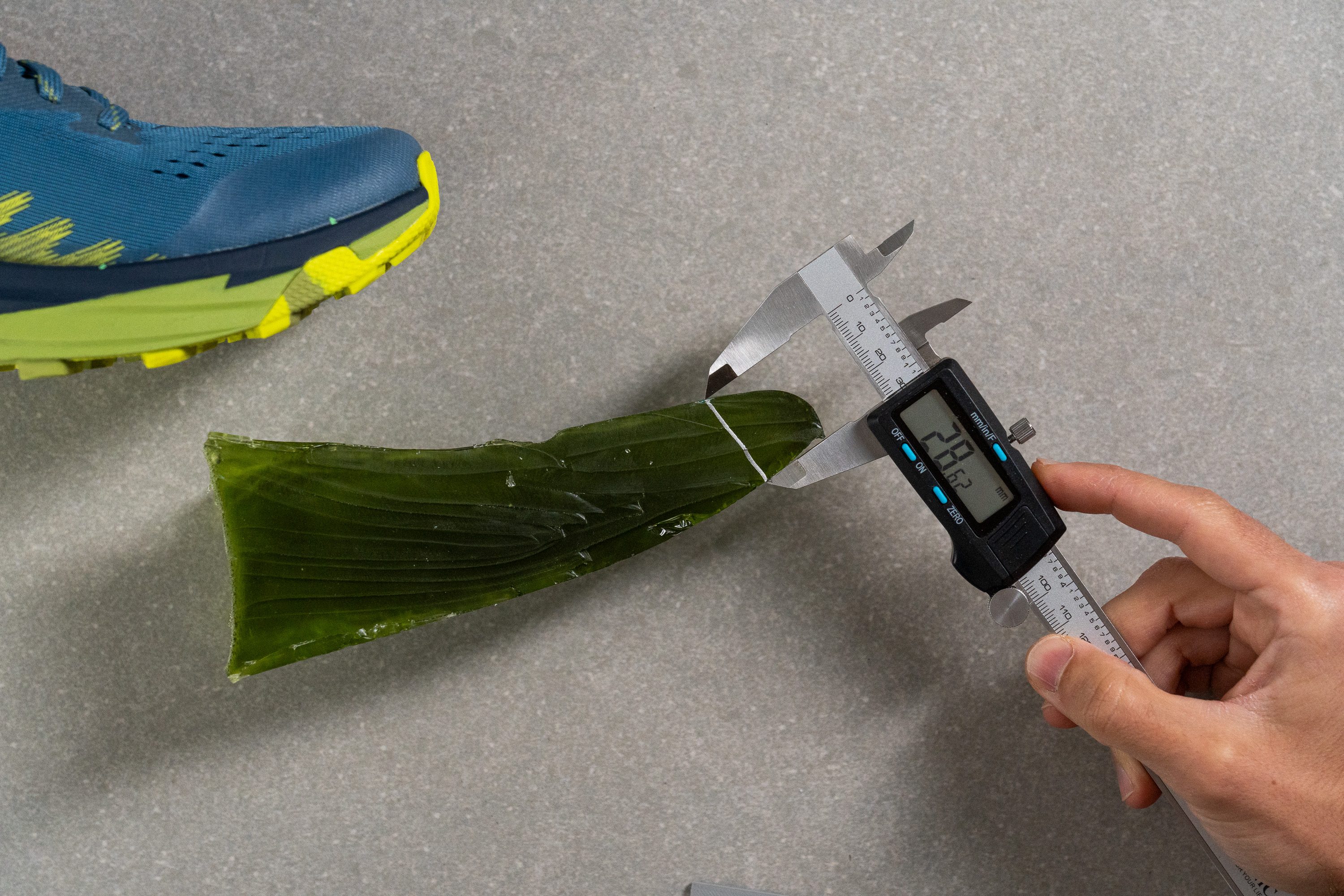
| Hoka Torrent 3 | 28.6 mm |
| Average | 27.0 mm |
Traction / Grip
Lug depth
Regarding the lugs, Hoka chose a classic approach aiming to be as versatile as possible, although this strategy risks underperforming in some terrains.
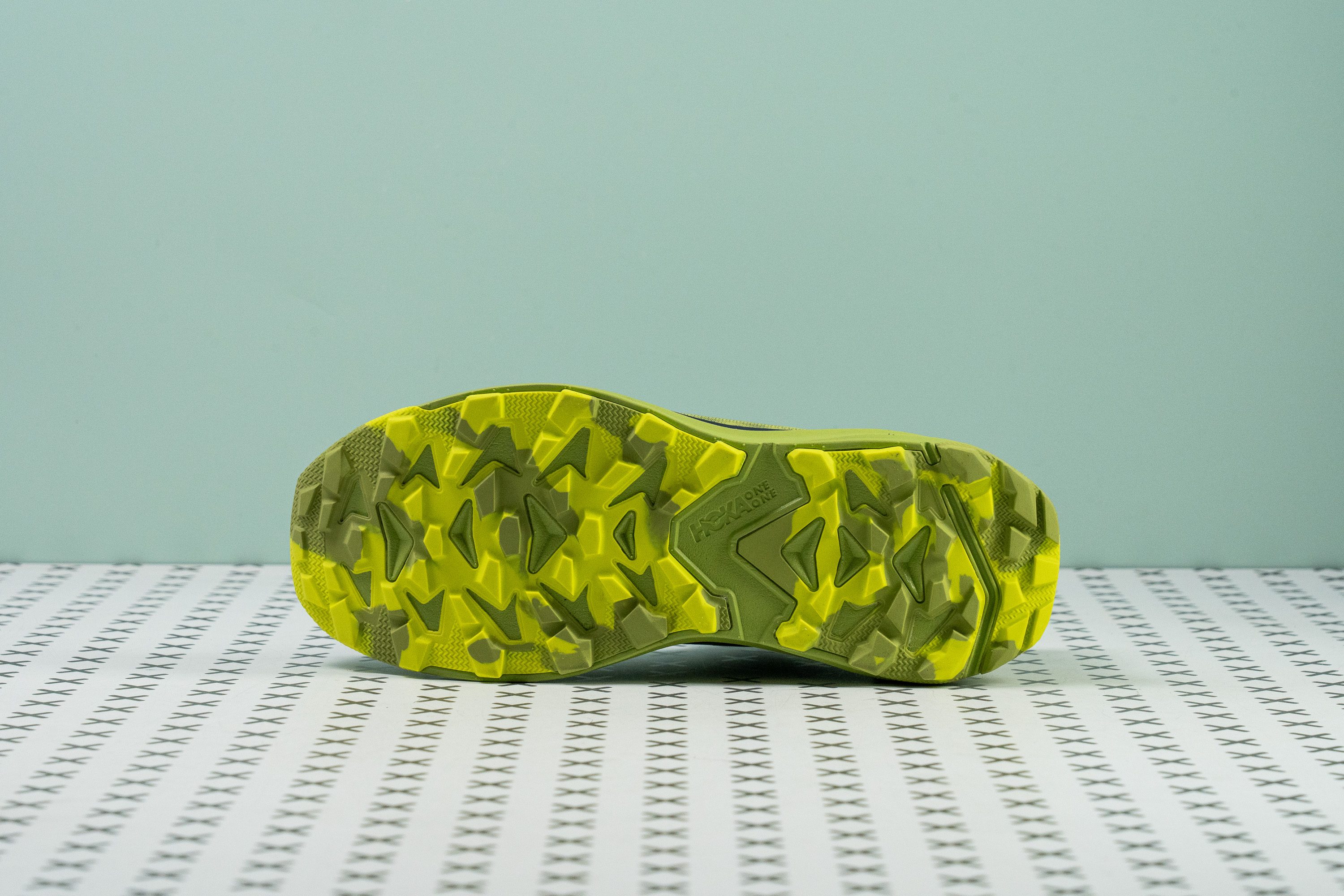
In our experience, the 3.6-mm lugs perform great on dry, smooth trails but fall short on technical or muddy trails, much like the Hoka Challenger 7. For wet and soft conditions, we recommend opting for a shoe with larger, chevron-shaped lugs, like the Salomon Speedcross 6.
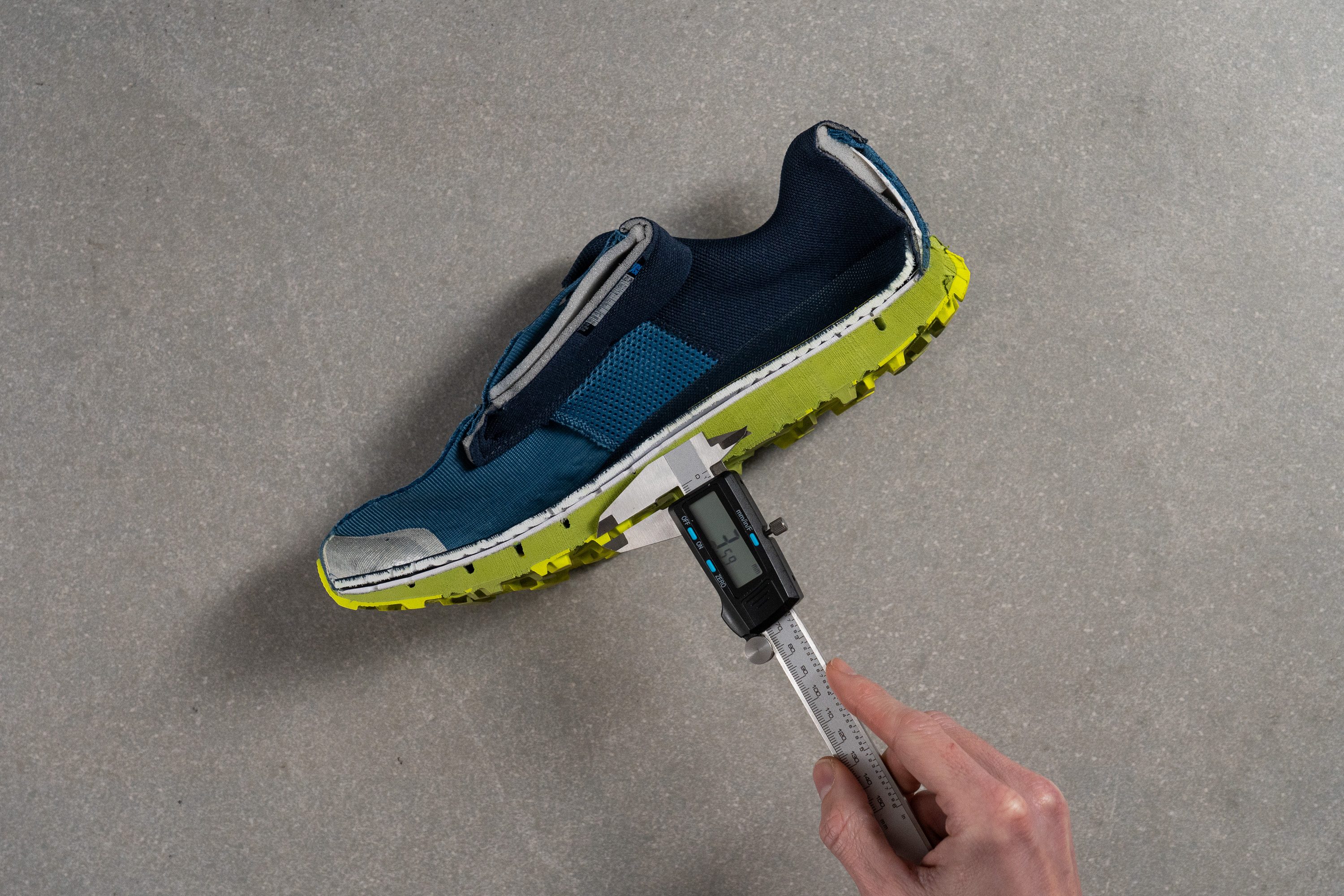
| Hoka Torrent 3 | 3.6 mm |
| Average | 3.5 mm |
Flexibility / Stiffness
We already mentioned the shoe's rigidity from a torsional standpoint, but what about its longitudinal flexibility? If it's just as rigid, this could make it really uncomfortable for easy runs or even hiking adventures.
Fortunately, in our 90-degree bend test, the shoe registered only 29.1N, which is pretty average. This level of flexibility allows the shoe to double as a hiking shoe if desired.
This test follows an older methodology, which is why you don't see recently tested shoes in the chart. Results from different methodologies can not be compared.
| Hoka Torrent 3 | 29.1N |
| Average | 27.1N |
Stiffness in cold
After freezing the shoe for 20 minutes, just as we did for the midsole softness test, we repeated the bending test. This time, the result was 33.5N.
| Hoka Torrent 3 | 33.5N |
| Average | 35.9N |
Stiffness in cold (%)
That's just a 15.1% increase, which is again a top-notch result for EVA-based midsoles. Great work from Hoka here.
| Hoka Torrent 3 | 15% |
| Average | 32% |
Weight
One of Hoka's standout achievements in the running shoe industry is creating shoes that are lighter than they appear, and the Torrent 3 is a prime example of this expertise.
Weighing in at just 9.1 oz or 258g, it's incredibly challenging to find trail shoes that offer a similar blend of decent cushioning and lightness.
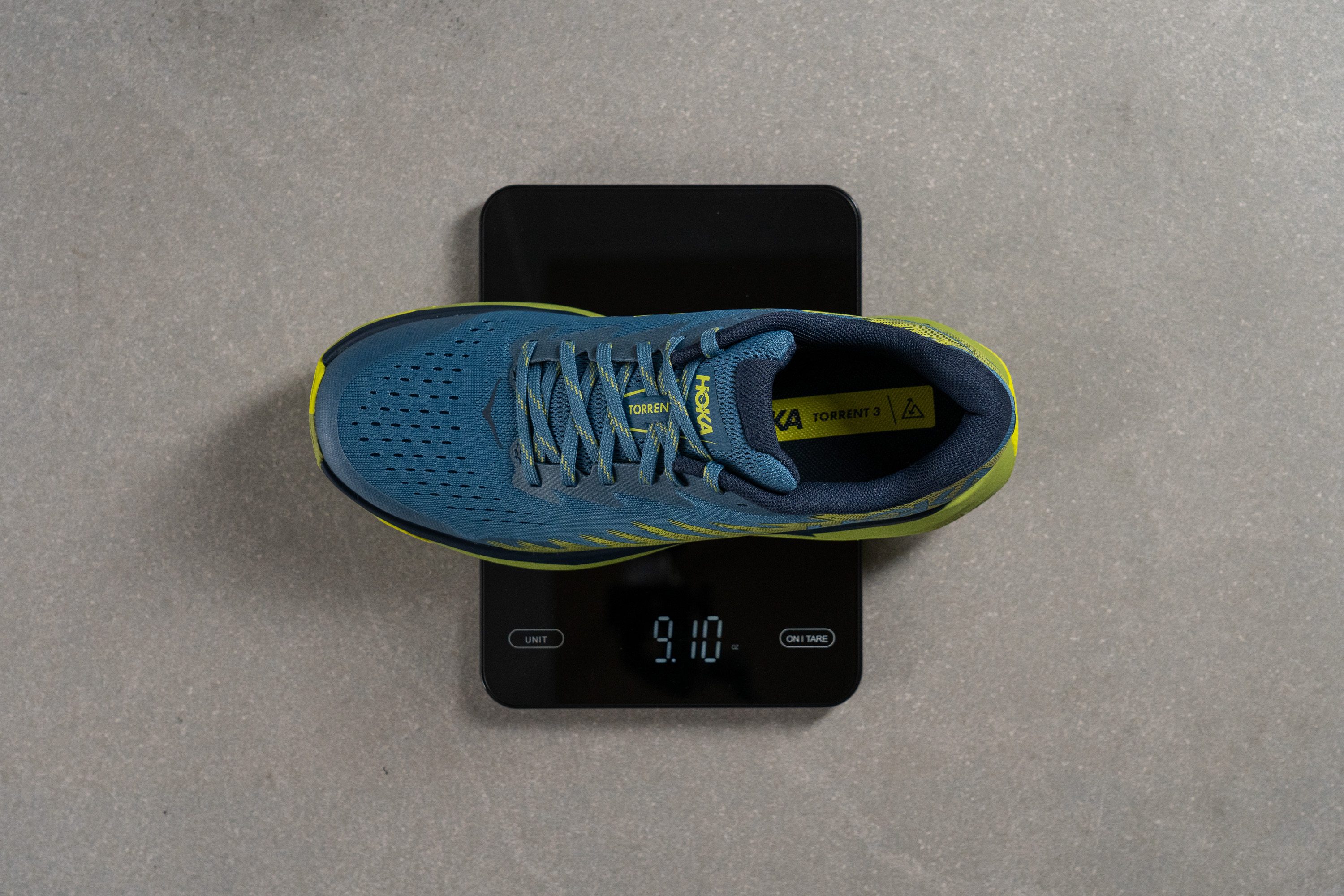
| Hoka Torrent 3 | 9.1 oz (258g) |
| Average | 10.2 oz (289g) |
Breathability
The importance of lab testing shoes, like we do at RunRepeat, becomes clear in situations like our experience with the Hoka Torrent 3.
At first glance, the upper appears extremely breathable—there are huge ventilation holes in the toebox and a thin mesh. However, we were surprised when we used our smoke machine on the shoe.
The airflow was clearly more limited than we expected from its appearance. We rated it a 3 out of 5.
When we held the shoe under the light, it seemed really breathable again, thanks to the thin mesh—not just in the toebox but also in the medial zone.
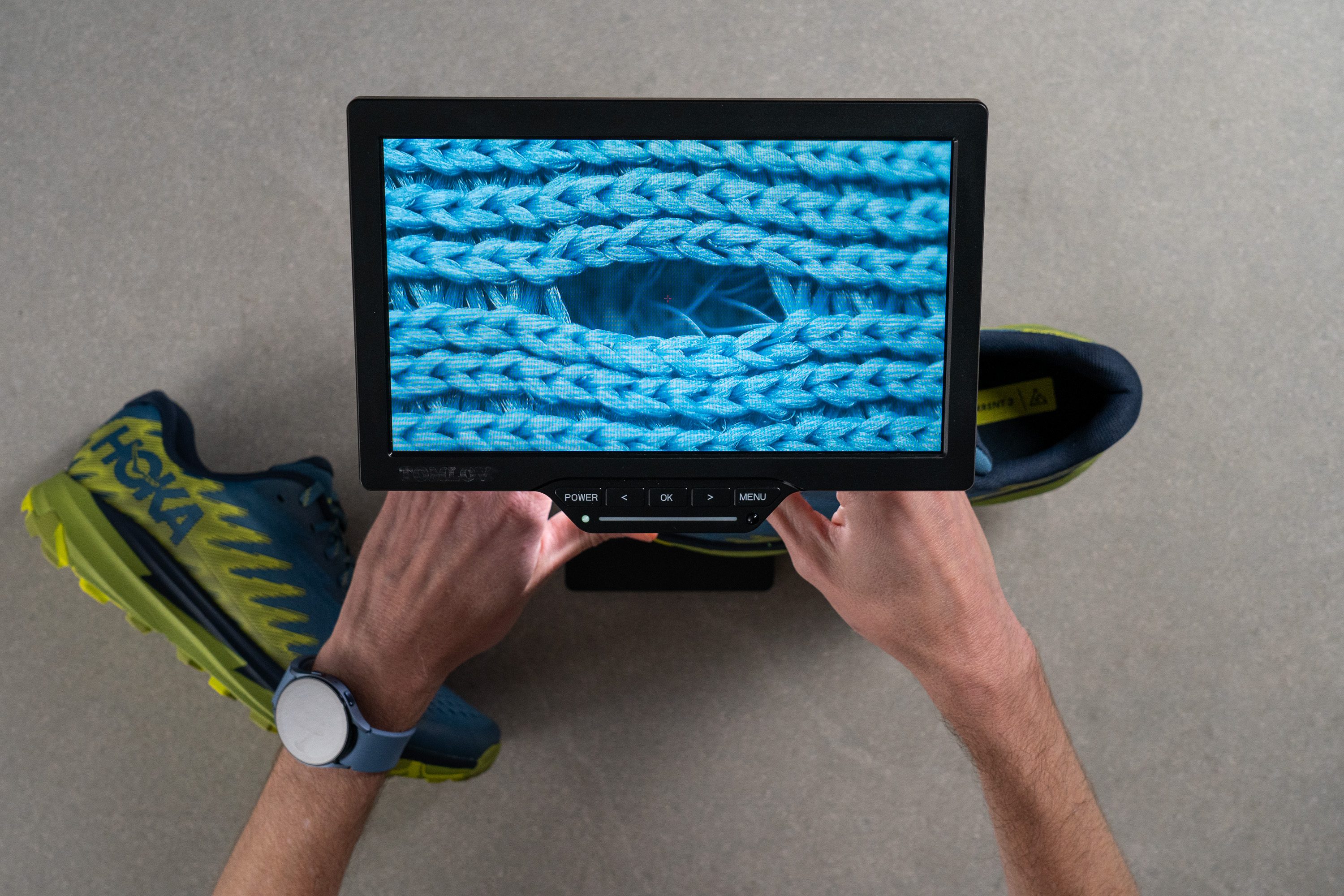
We then used a microscope to take a closer look at the mesh. We saw the ventilation holes but noticed there's a mesh layer beneath them, which restricts pure airflow.
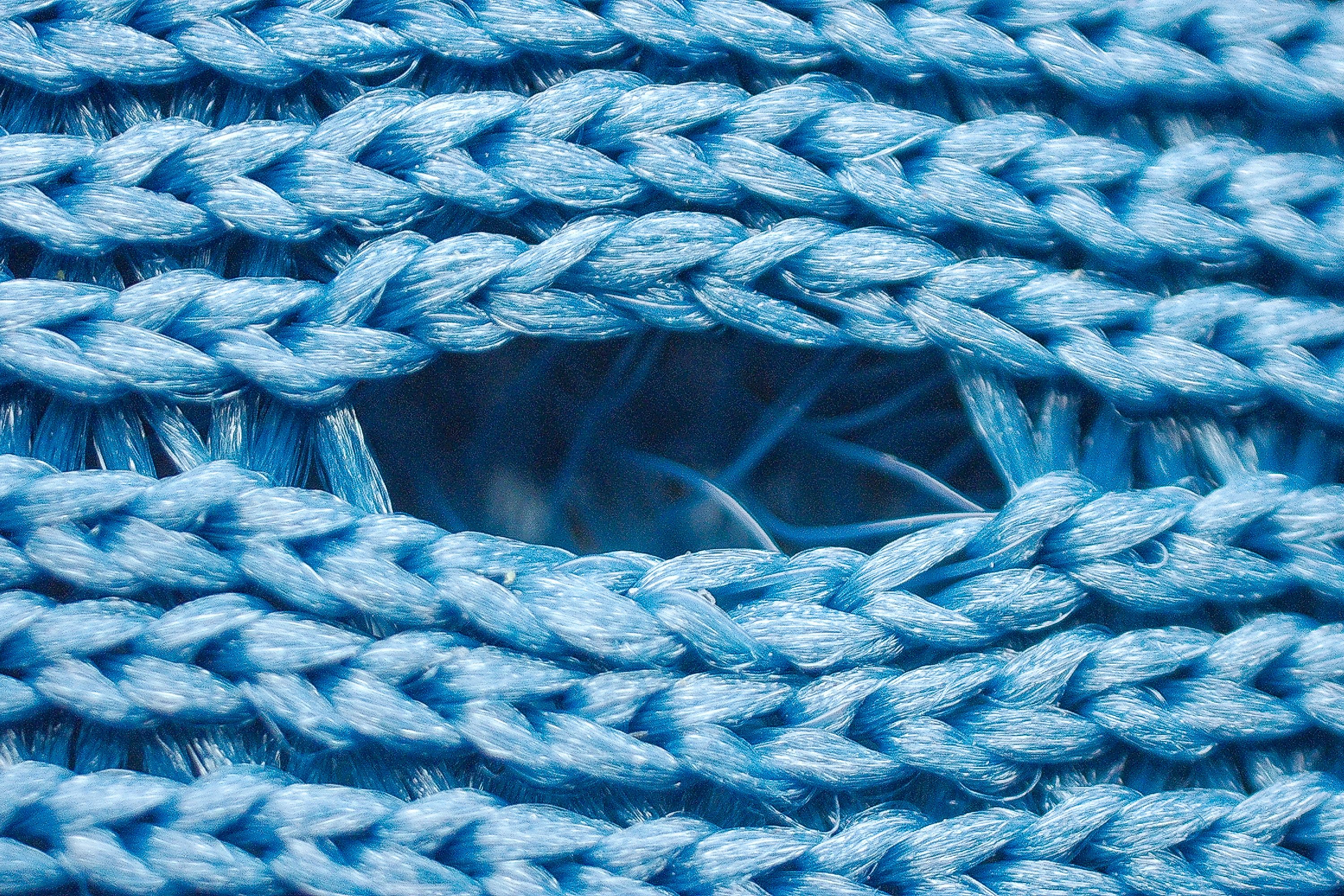
It's true that for a trail running shoe, breathability isn't critical, and even sometimes unwanted. Yet, this shoe could have easily scored a 4 out of 5 in our test if the internal fabric had also been perforated.
| Hoka Torrent 3 | 3 |
| Average | 3.3 |
Stability
Lateral stability test
In our opinion, if you're a neutral runner or even have mild pronation issues, the Torrent 3 will provide fantastic stability no matter what.
It combines multiple elements, which we'll discuss in this section, to offer one of the most stable rides we've experienced during our lab reviews.
Torsional rigidity
Clearly, not having a super tall platform helps in providing a stable ride. But a larger part of the stability comes from the shoe's impressive torsional rigidity.
This prevents the shoe from collapsing and moving laterally. It really pays off in terms of stability while running on easy terrain; although, of course, there's a trade-off—less agility on technical trails.
| Hoka Torrent 3 | 5 |
| Average | 3.6 |
Heel counter stiffness
The heel counter appeared quite average to us, providing sufficient flexibility to be comfortable yet stable. We rated it a 3 out of 5, which is in line with most shoes.
| Hoka Torrent 3 | 3 |
| Average | 3 |
Midsole width - forefoot
With this shoe, we quickly realised that its stability comes more from rigidity than width. The reason behind this is to keep the weight as low as possible.
That's why we measured an average width in the Torrent 3 at just 112.8 mm.
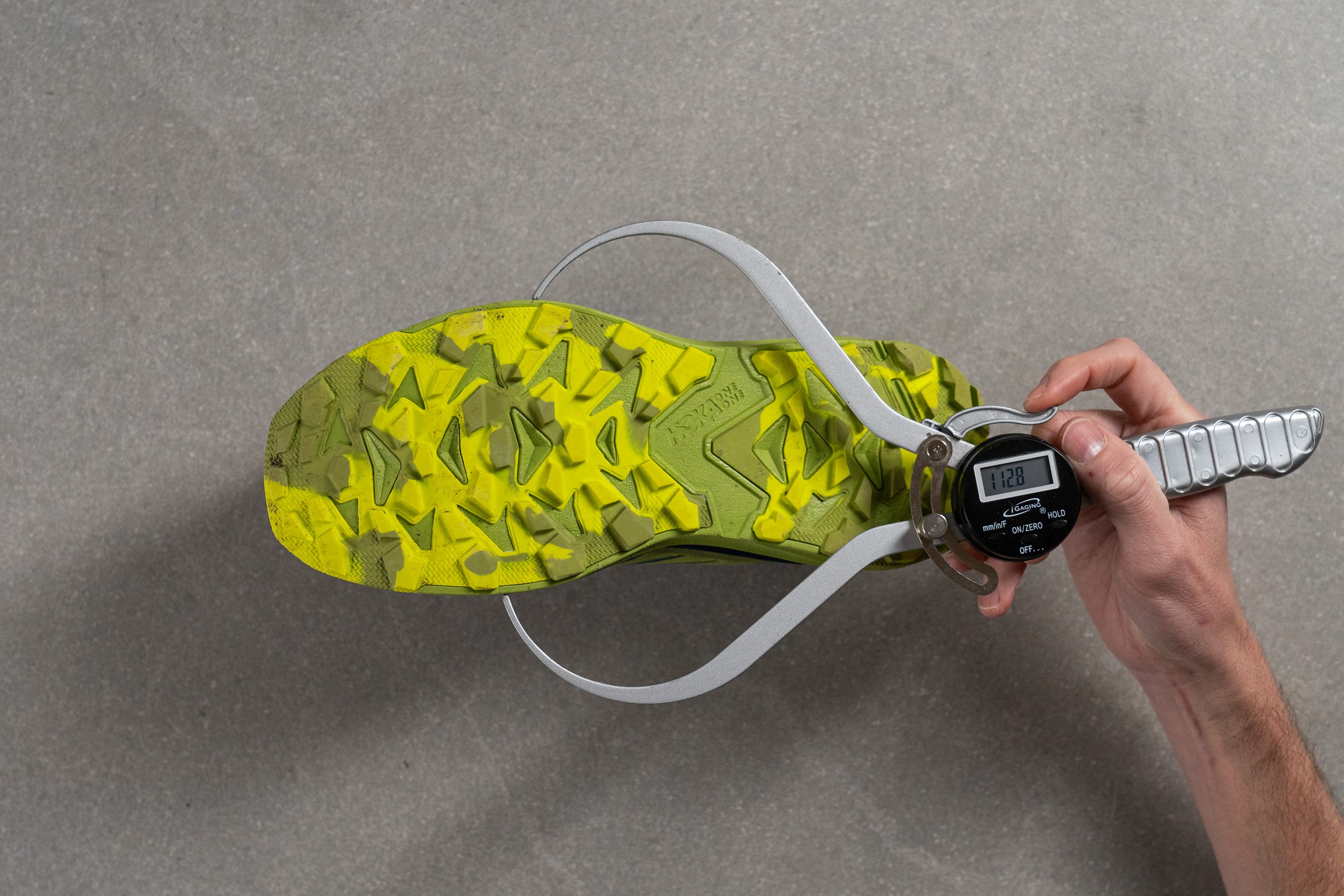
| Hoka Torrent 3 | 112.8 mm |
| Average | 112.8 mm |
Midsole width - heel
The heel, however, is a bit wider than average at 93.5 mm, clearly designed to enhance stability for heel strikers.
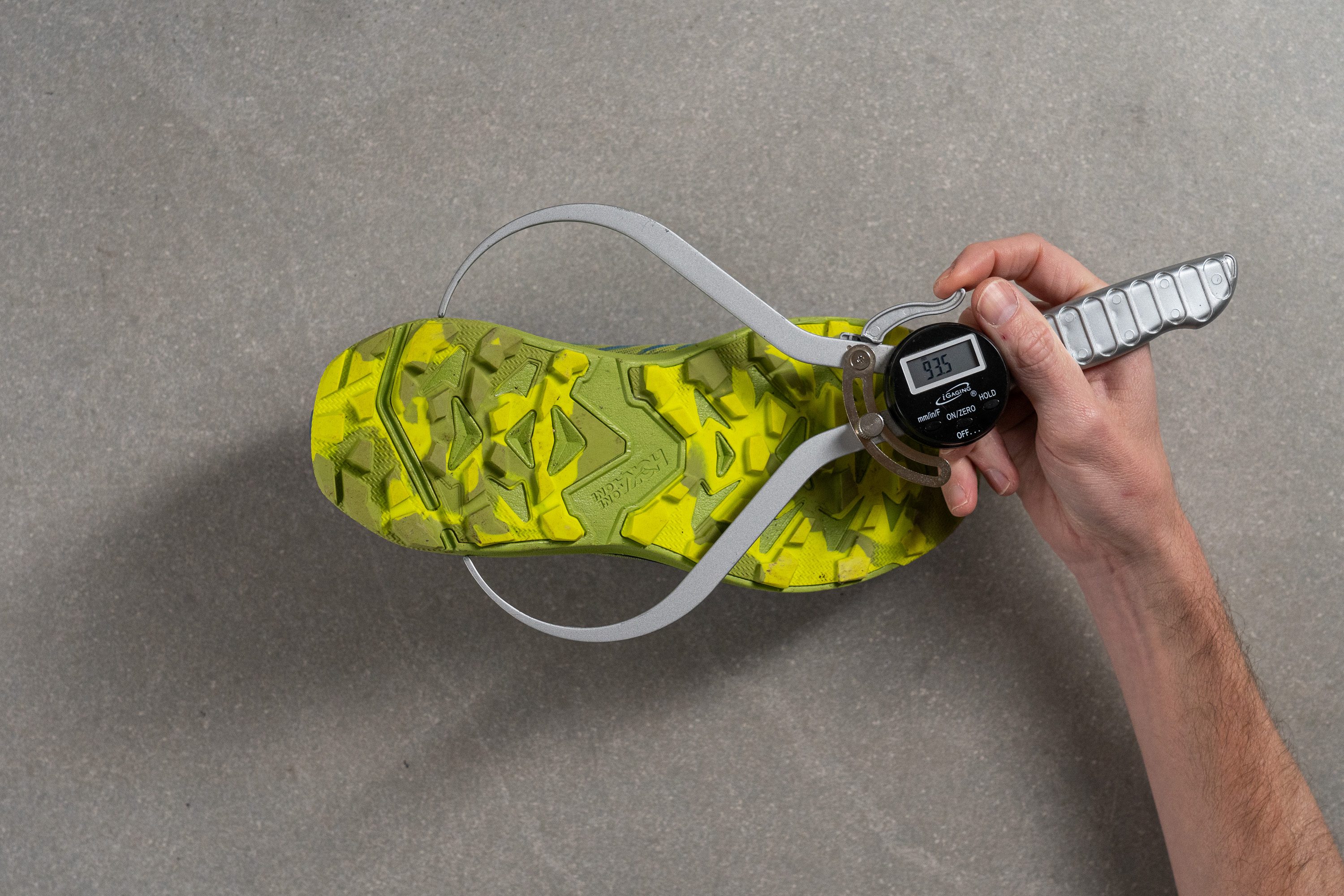
| Hoka Torrent 3 | 93.5 mm |
| Average | 89.9 mm |
Durability
Toebox durability
After completing our breathability test, we shifted focus to evaluating the durability of the upper.
Our Dremel did cause some damage, but it wasn't enough to create a full hole in the engineered mesh. Thanks to this, the Torrent 3 impressively scored a solid 3 out of 5 in our durability test.
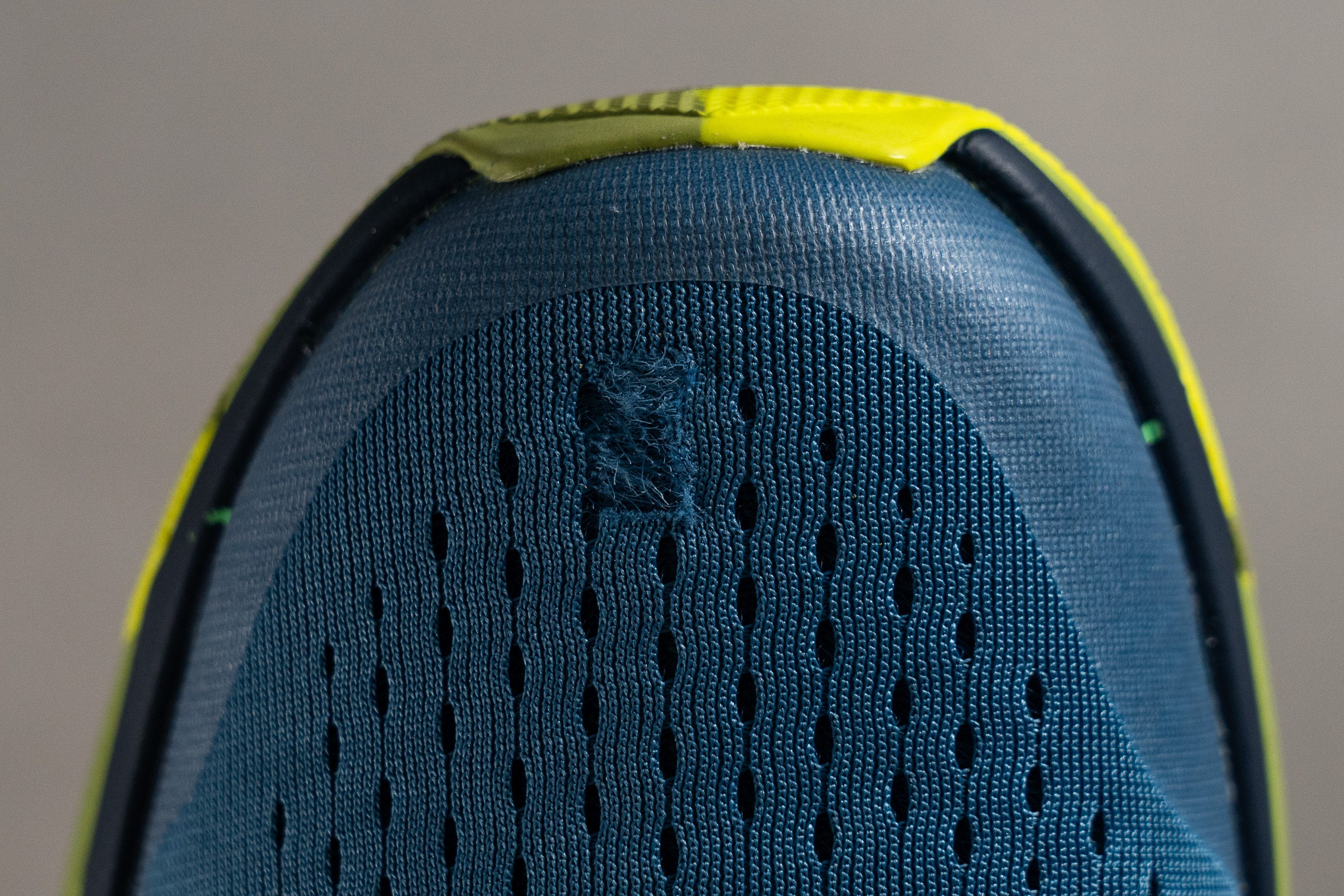
| Hoka Torrent 3 | 3 |
| Average | 3.1 |
Heel padding durability
We then shifted our attention to evaluating the heel padding's durability with another round of Dremel testing.
This time, the outcome was disappointing. The heel fabric could only muster a below-average score of 2 out of 5, falling short of our expectations.
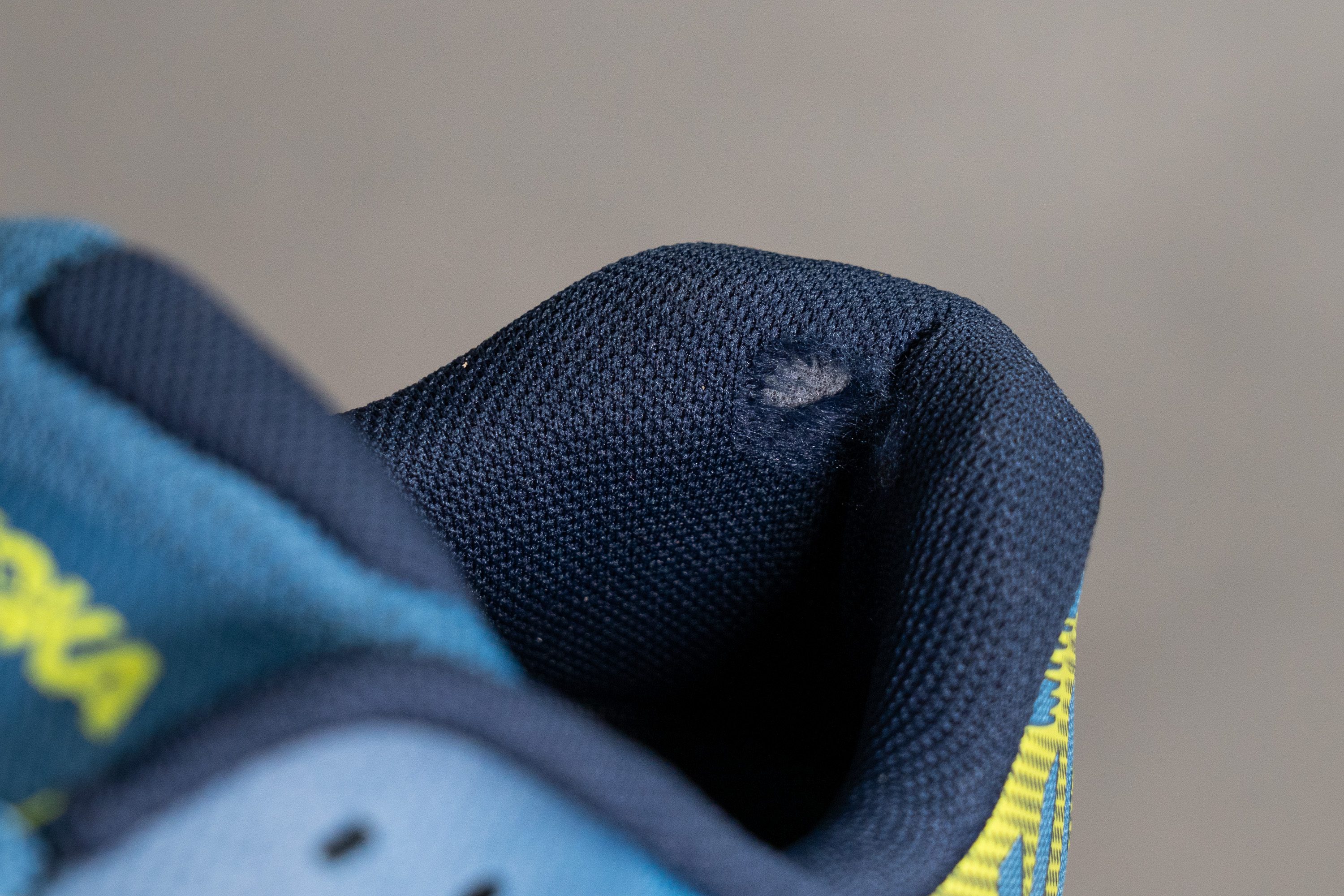
| Hoka Torrent 3 | 2 |
| Average | 3 |
Outsole hardness
After examining the toebox and heel, we turned our attention to the outsole, a crucial component in all trail shoes.
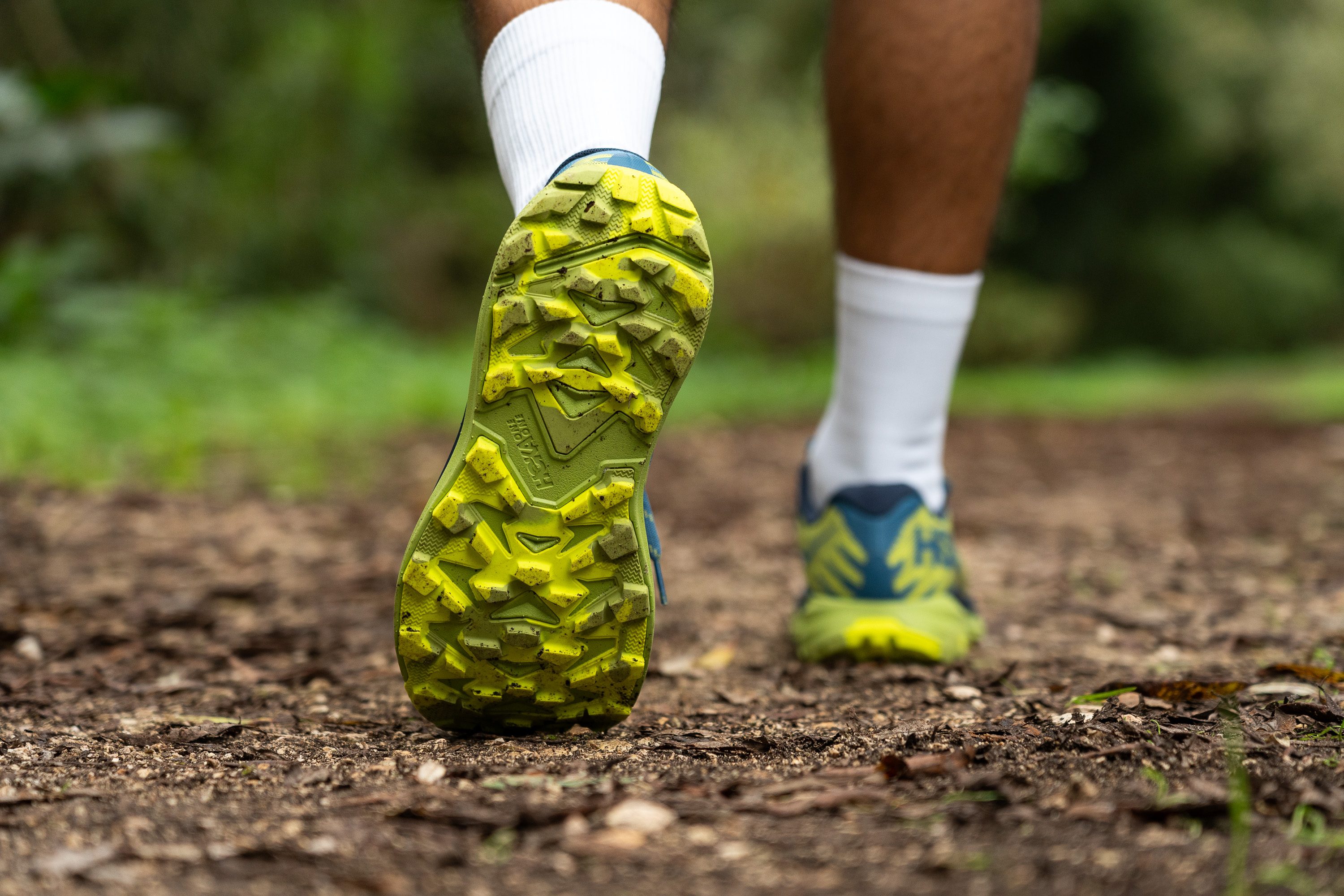
We discovered that the outsole has an average hardness, measuring 84.0 on the HC scale.
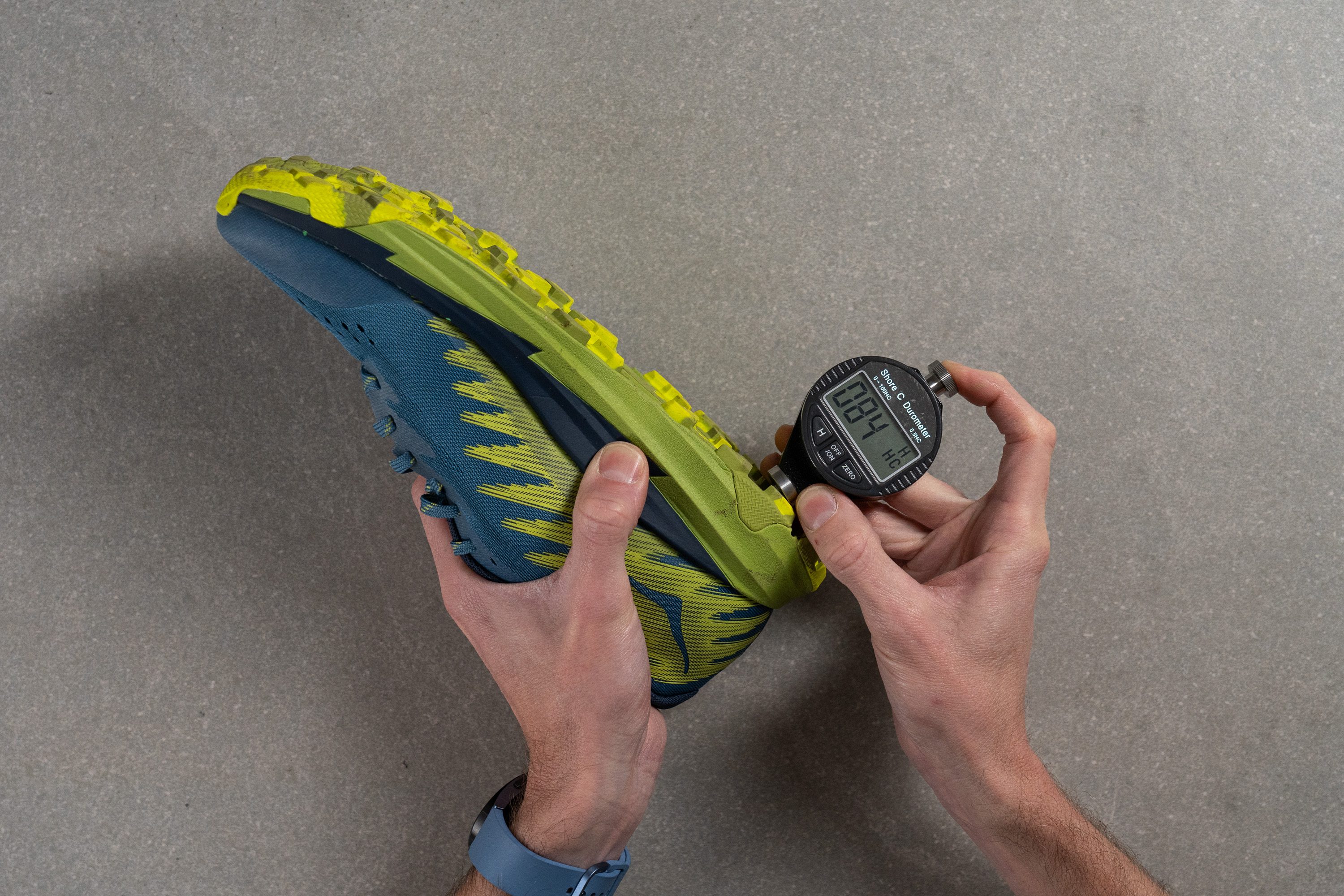
| Hoka Torrent 3 | 84.0 HC |
| Average | 85.8 HC |
Outsole durability
With this level of hardness, we anticipated average durability. However, the Torrent 3's rubber outperformed our expectations with a mind-blowing performance.
The Dremel test only managed to erase a mere 0.3 mm, an incredible result that speaks volumes about its exceptional durability.
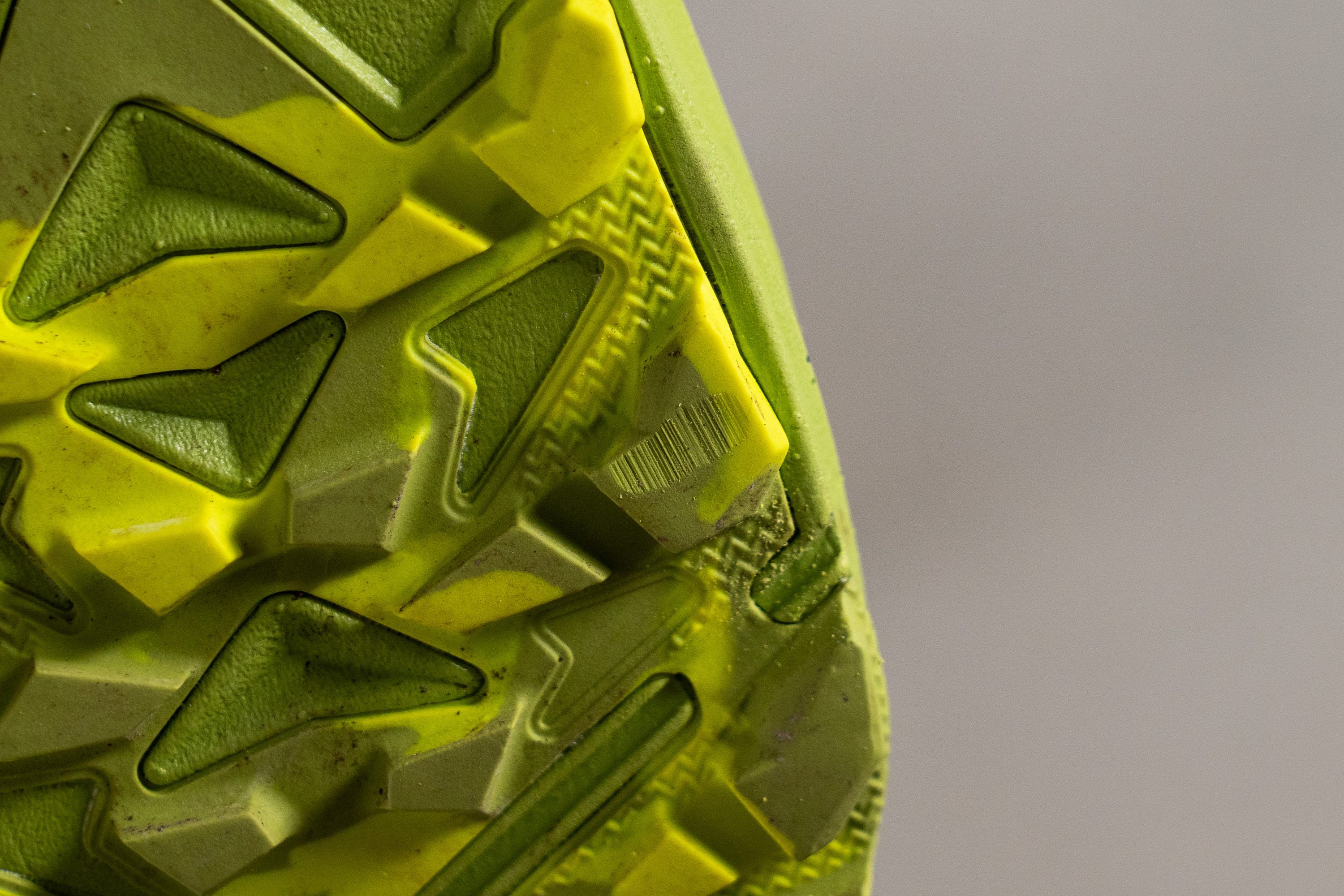
| Hoka Torrent 3 | 0.3 mm |
| Average | 0.9 mm |
Outsole thickness
Despite having only 1.8 mm thickness in the outsole (+ lugs), the Torrent 3 might just be one of the most durably crafted shoes out there based on our previous test.
We have zero worries about wearing out the outsole.
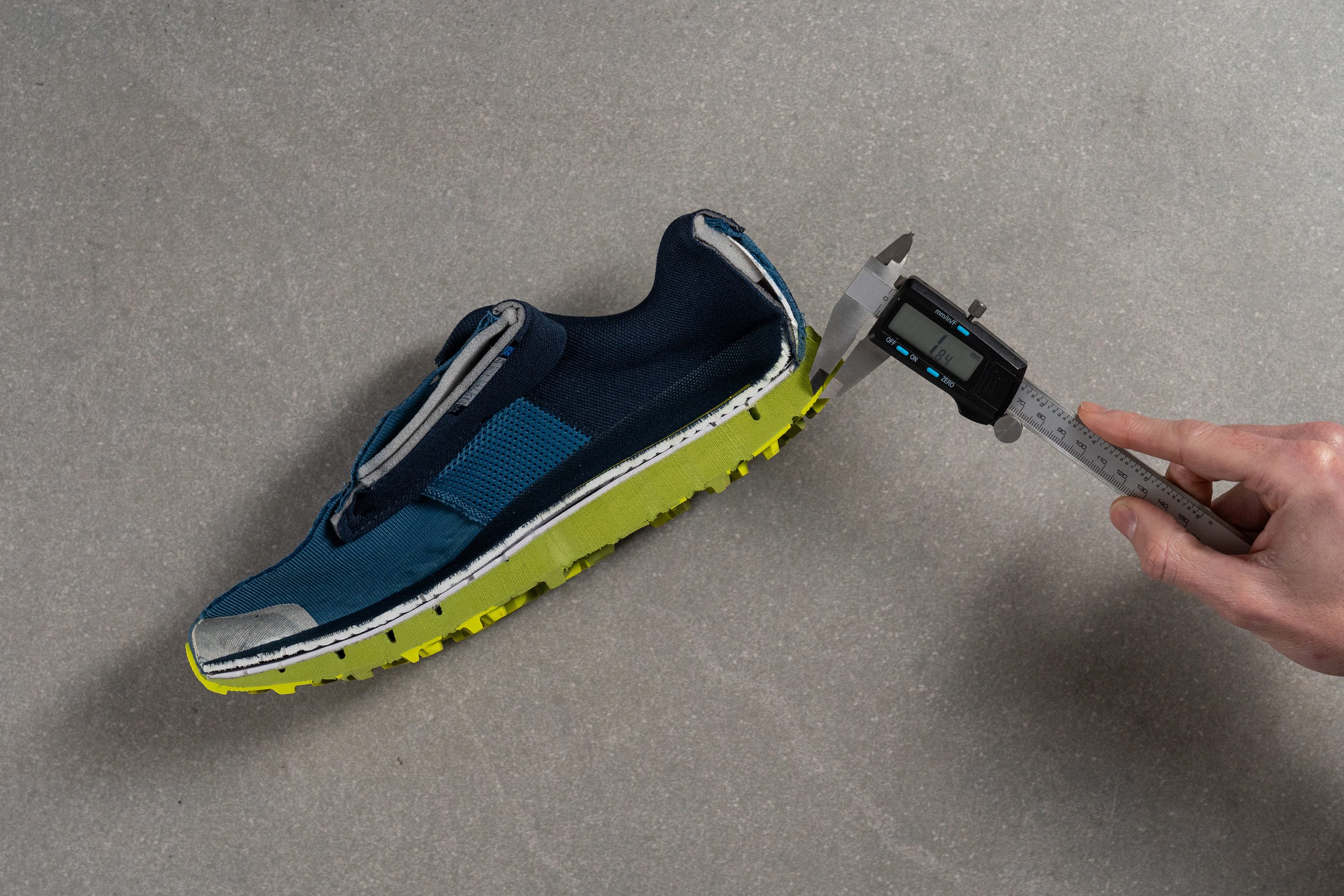
| Hoka Torrent 3 | 1.8 mm |
| Average | 2.2 mm |
Misc
Insole thickness
As part of their effort to reduce weight, Hoka equipped the shoe with a thinner outsole, which we precisely measured at 3.8 mm. However, we didn't experience any discomfort with it.
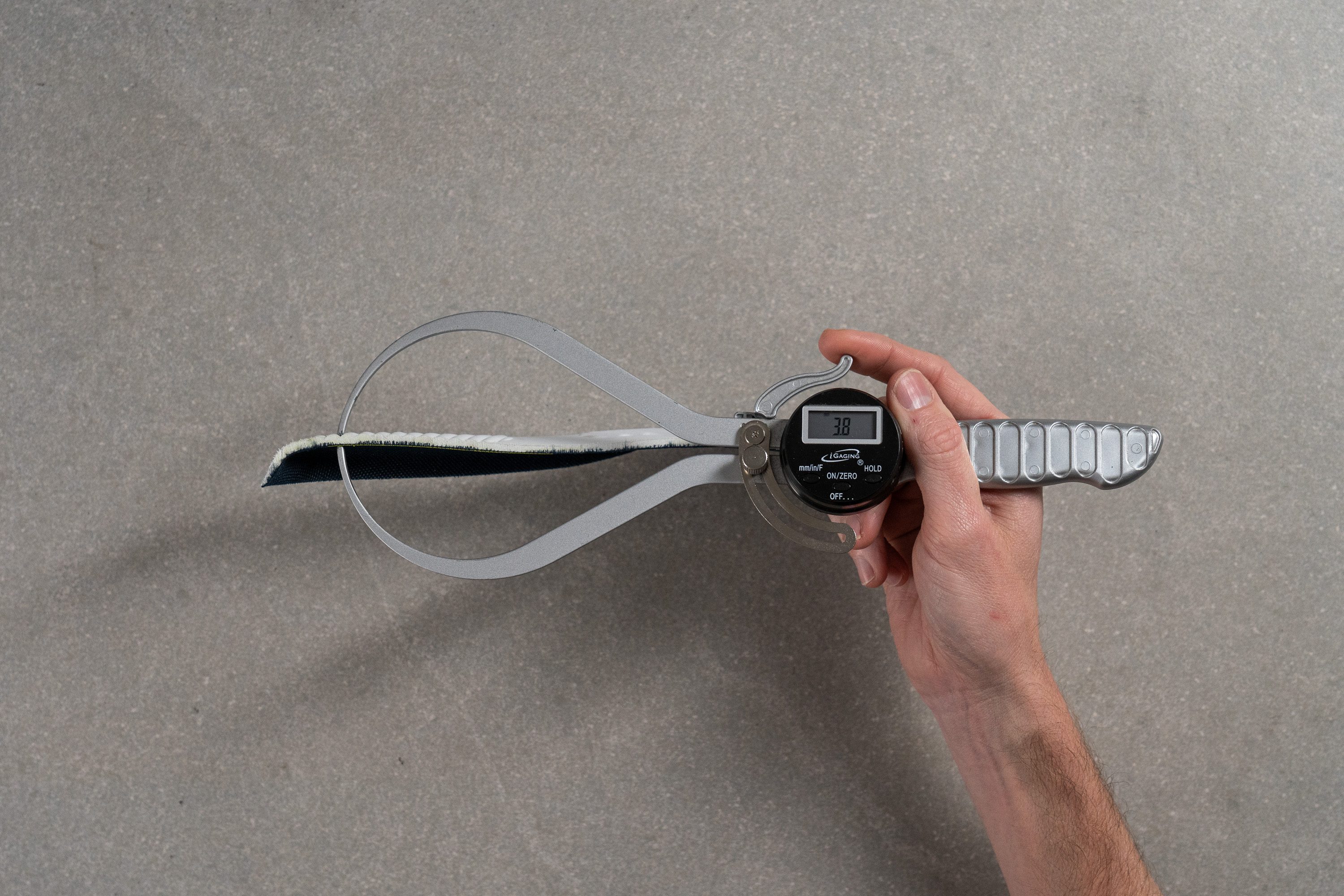
| Hoka Torrent 3 | 3.8 mm |
| Average | 4.7 mm |
Removable insole
The insole is fully removable since it's not glued to the midsole.
Additionally, we were pleasantly surprised to find that it's one of the few shoes that we have tested offering a perforated model, thoughtfully designed to enhance ventilation under the foot.
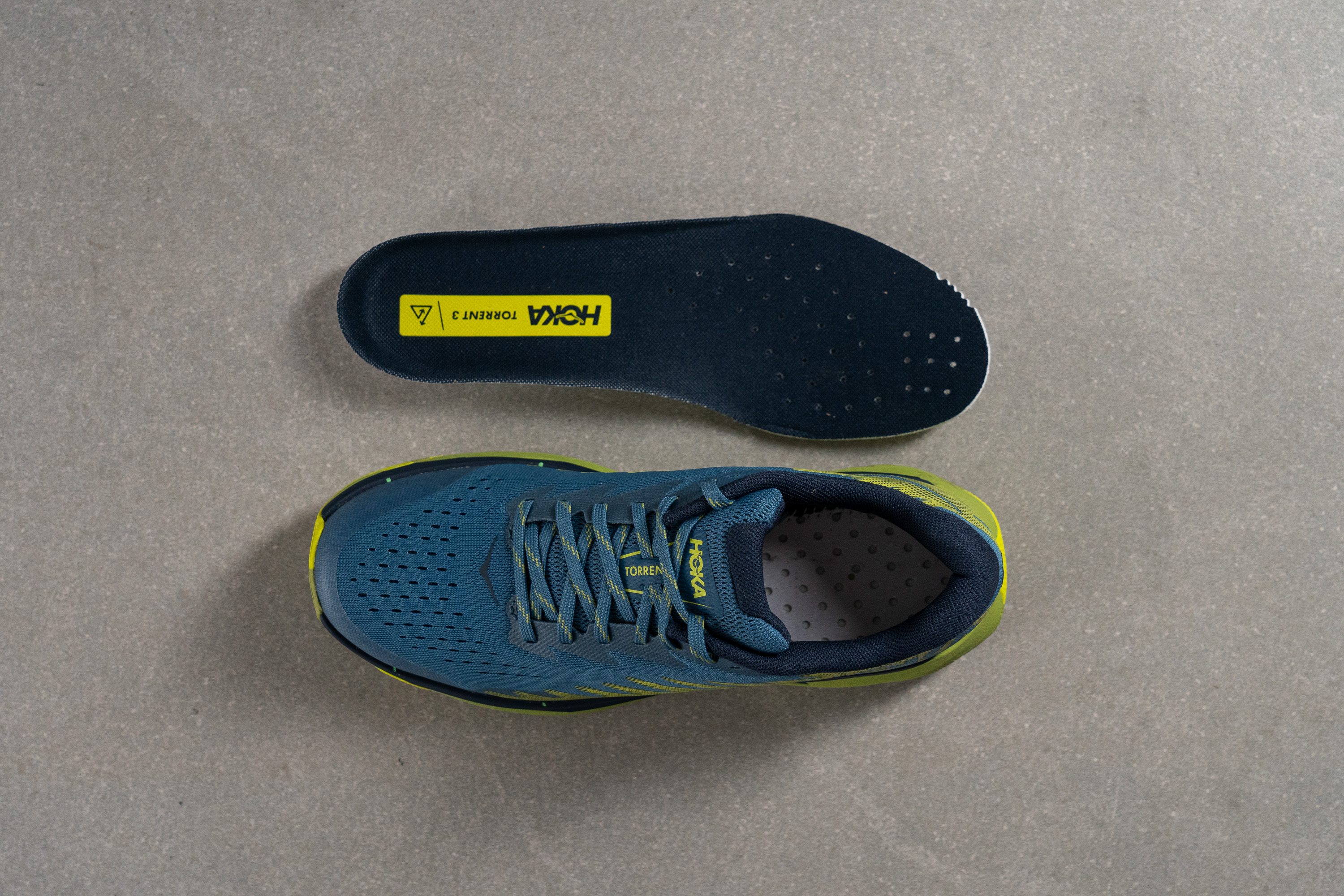
| Hoka Torrent 3 | Yes |
Midsole softness in cold
When it's cold out, you can expect the Torrent 3 to feel the same. We tested this by putting the shoe in our freezer for 20 minutes. Afterward, we measured it again and got a 25.3 HA value on our durometer.
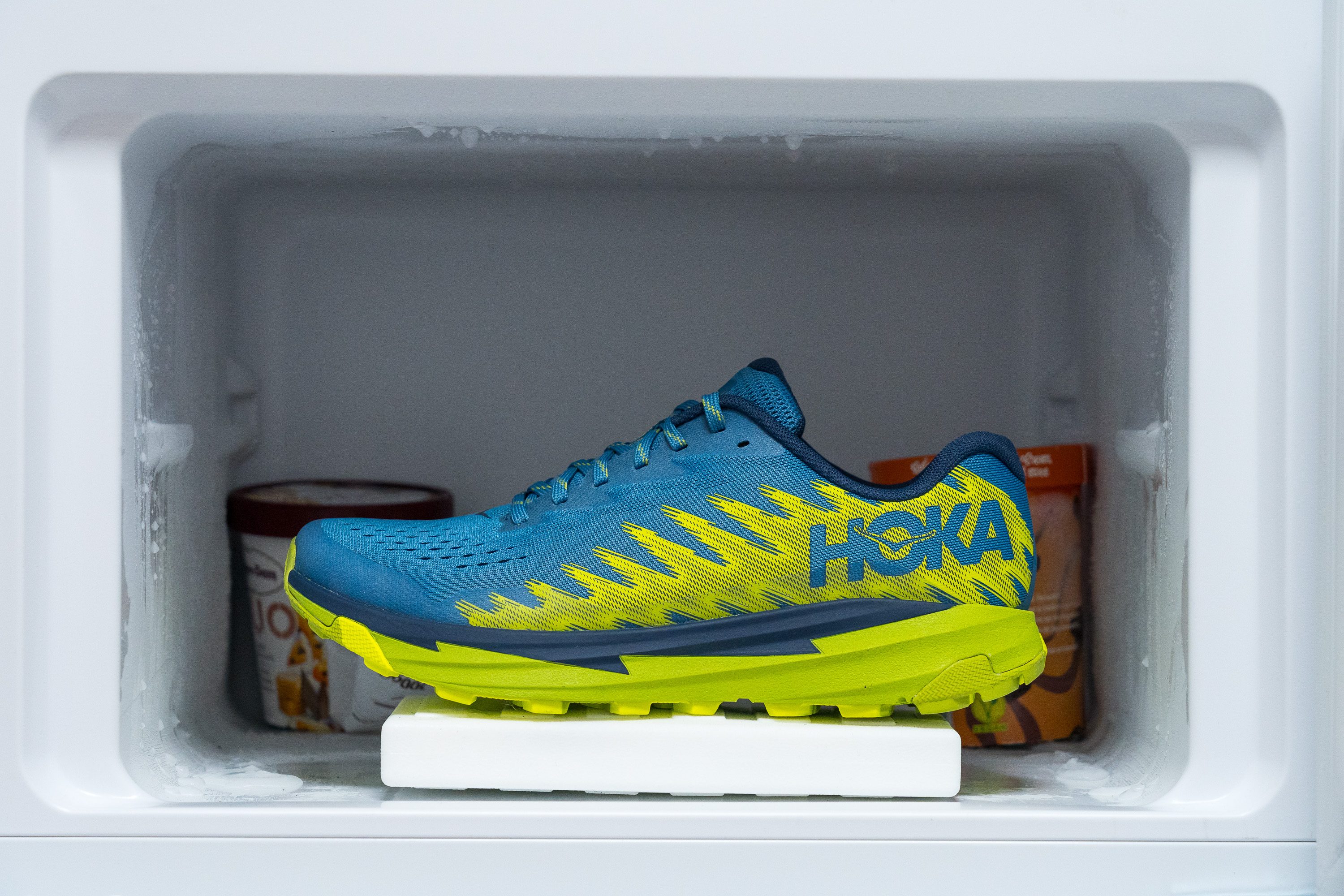
| Hoka Torrent 3 | 25.3 HA |
| Average | 27.4 HA |
Midsole softness in cold (%)
That's just a 5.7% difference, which is an outstanding performance. We can partly attribute this to the denser formulation of this particular ProFly variation.
| Hoka Torrent 3 | 6% |
| Average | 26% |
Reflective elements
We were disappointed to discover that the Torrent 3 has absolutely no reflective elements.
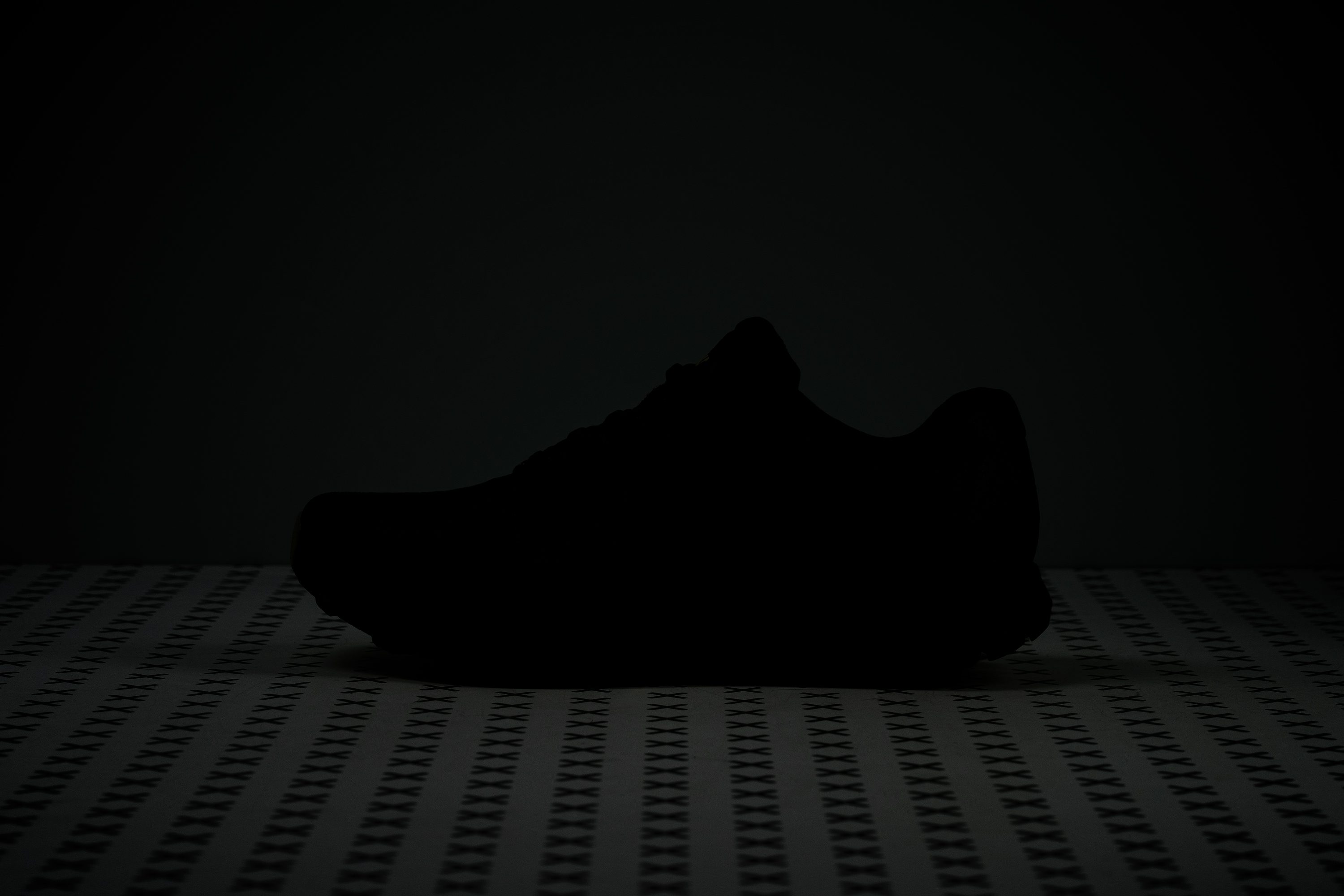
| Hoka Torrent 3 | No |
Tongue padding
However, we were quite taken aback when we measured the tongue thickness. Shockingly, it came in at 10.0 mm, which is baffling to us.
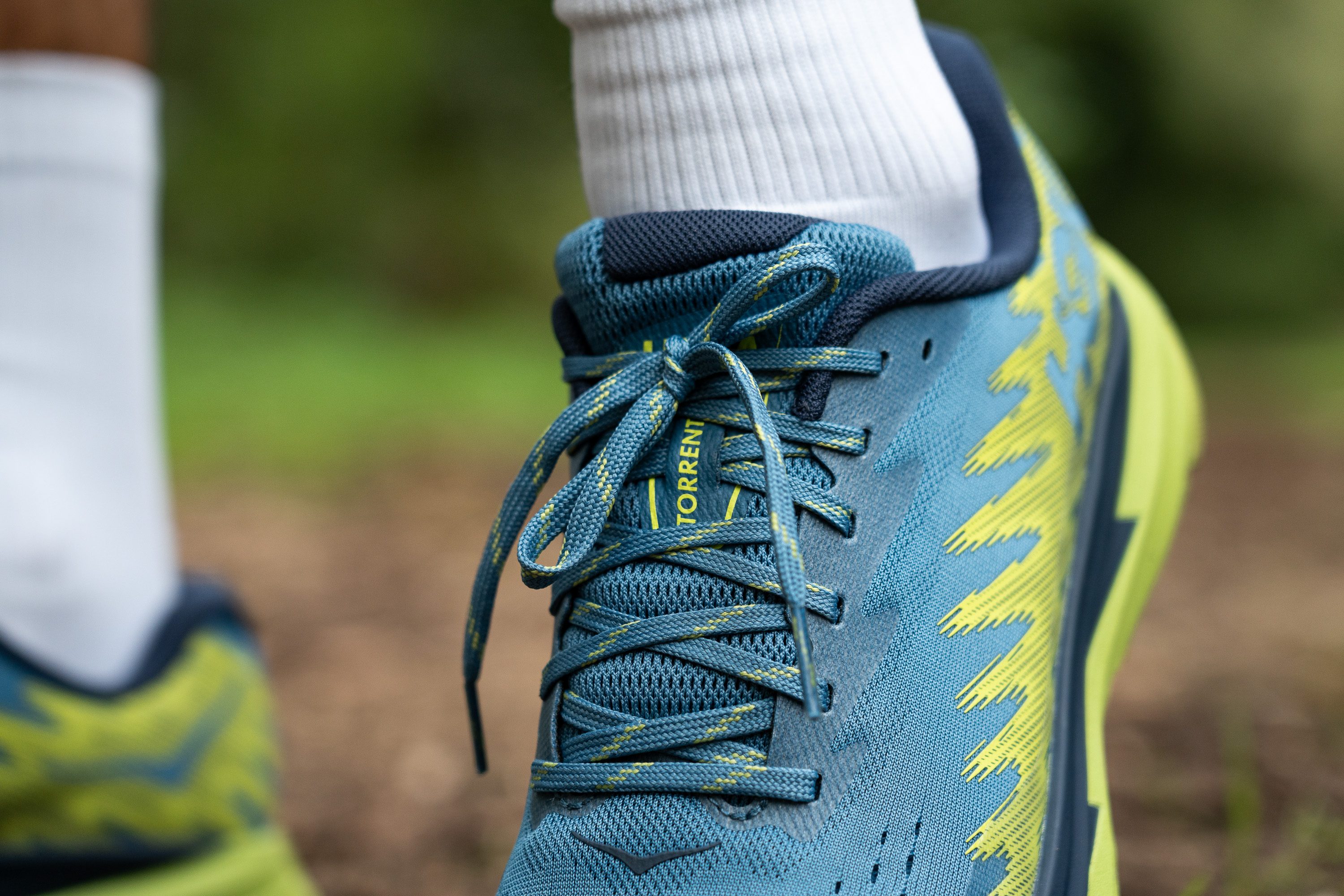
If the shoe is designed for shorter distances and emphasises lightness in every aspect, why opt for an ultra-thick, heavy tongue? We believe a single slab of foam with a thickness of just 5 mm would have been great.
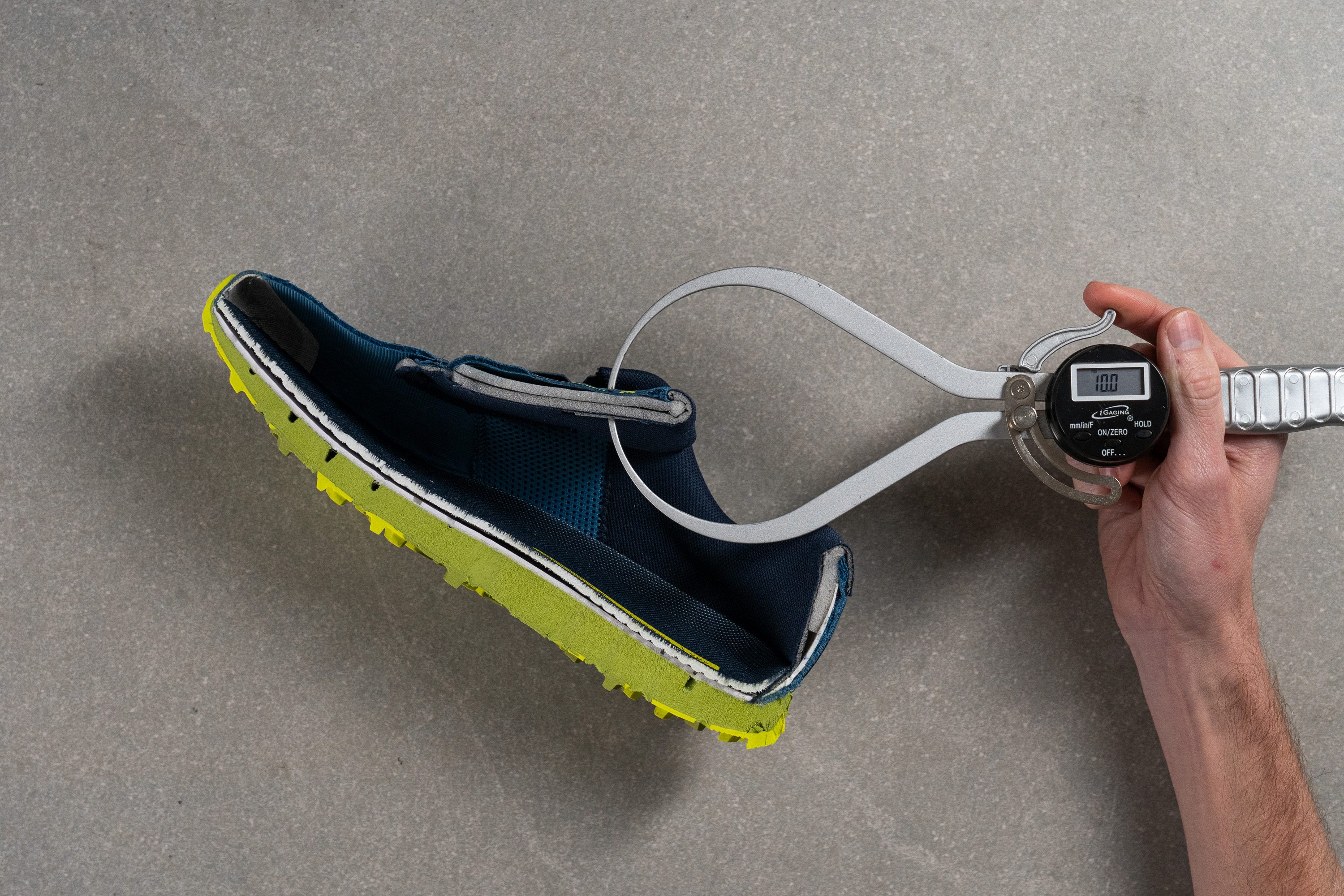
| Hoka Torrent 3 | 10.0 mm |
| Average | 6.4 mm |
Tongue: gusset type
Another sign that this is more of an all-terrain shoe is the tongue design. Instead of a protective, fully-gusseted tongue, it features a nimble and lighter semi-gusseted tongue.
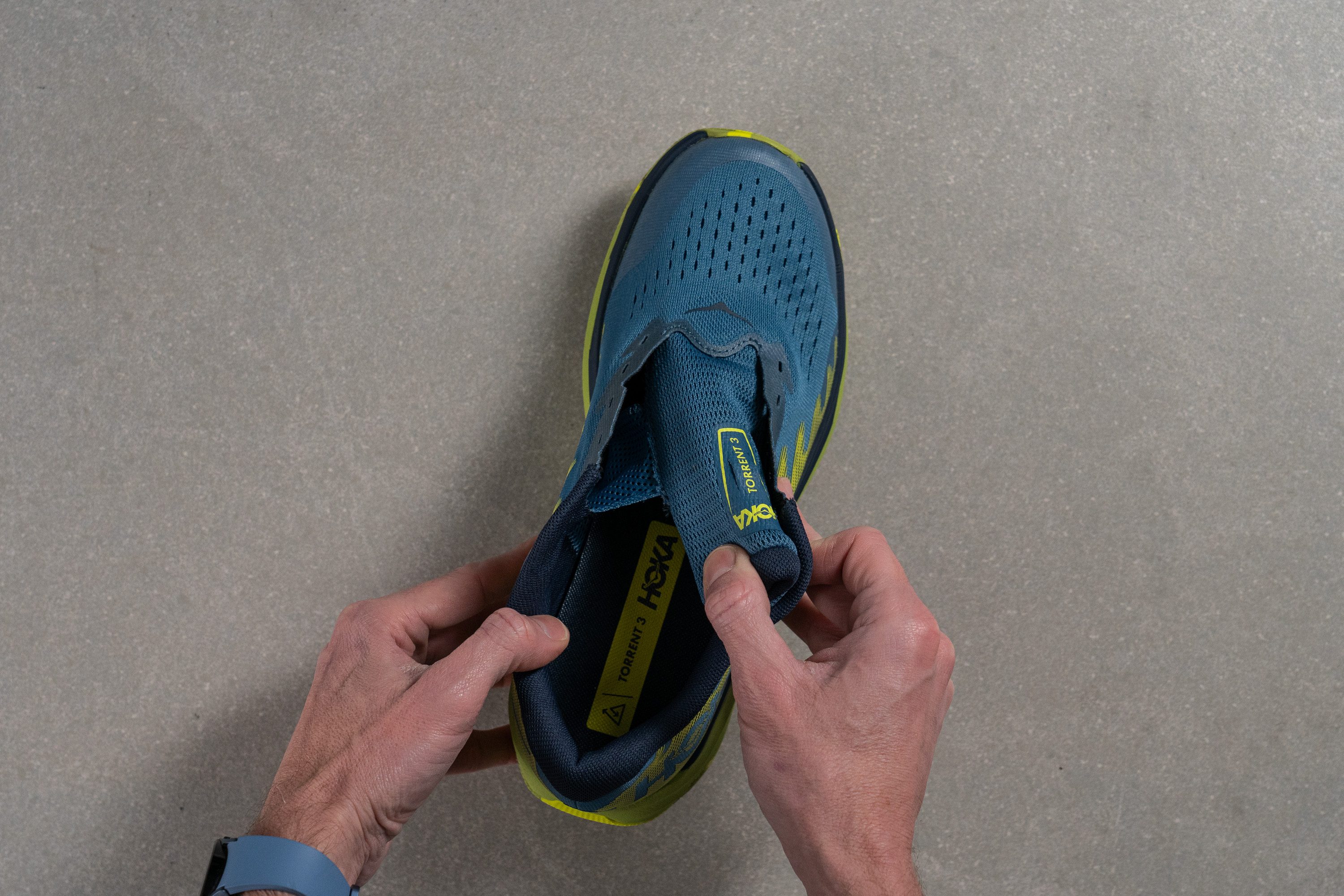
| Hoka Torrent 3 | Both sides (semi) |
Heel tab
The heel doesn't have the classic swallowtail design found on many Hoka shoes, nor a finger-loop heel tab.
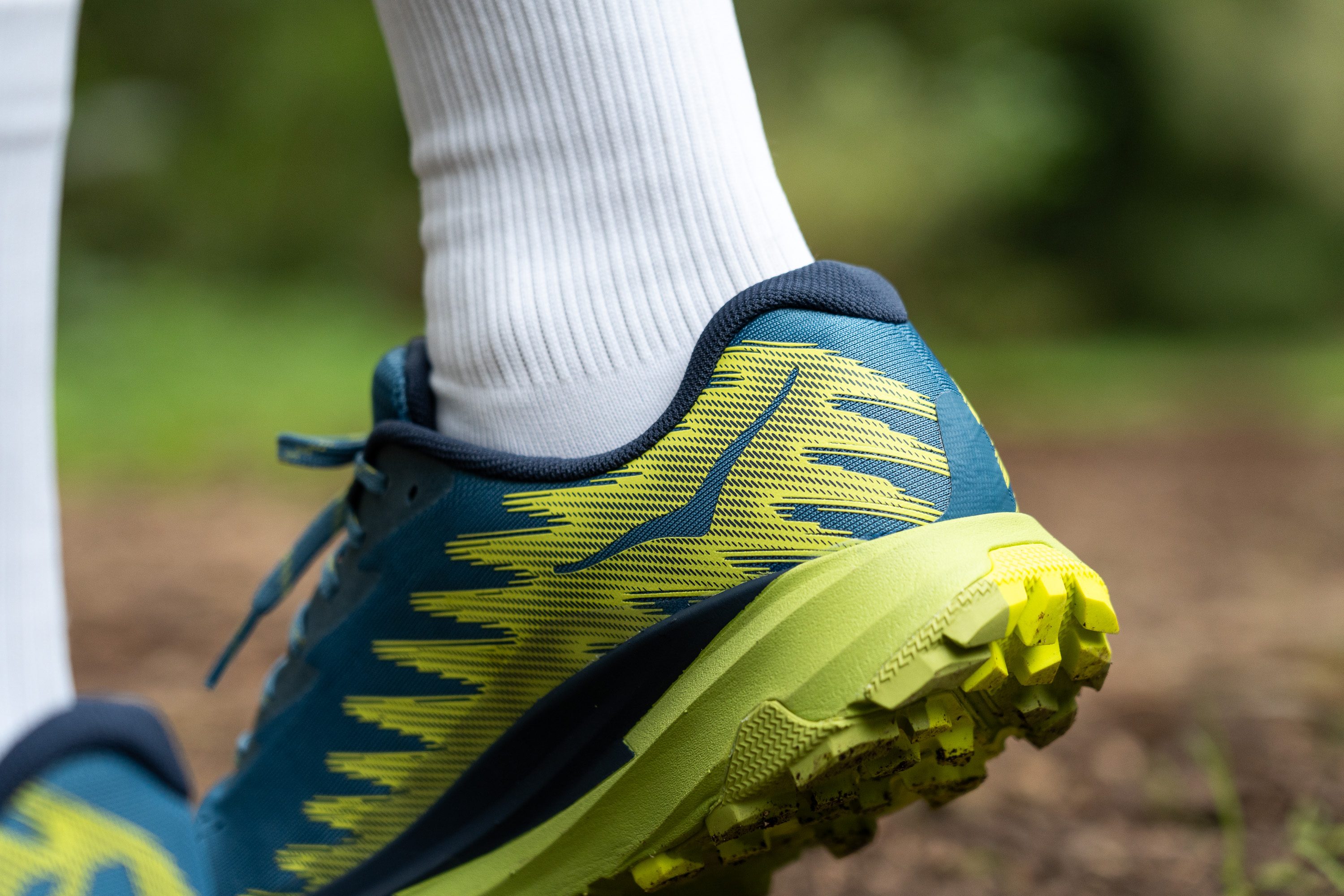
| Hoka Torrent 3 | None |

